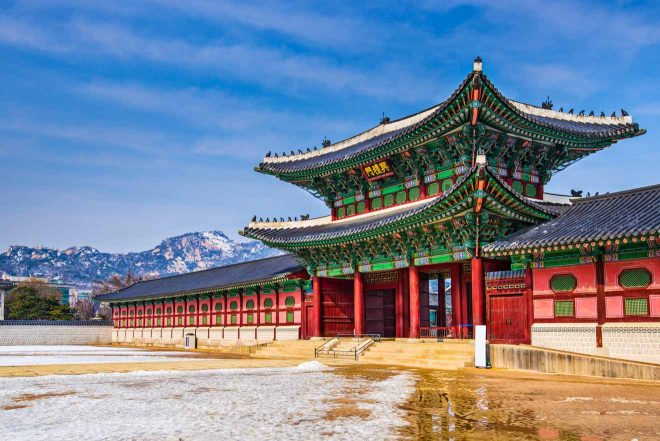
Seoul is the capital of South Korea and probably one of the most impressive cities you could ever dream of visiting! There are endless things to do there, and if you are wondering why I say that, just check this list of great things to do in Seoul!
While I was in Seoul, my list of potential places to visit only grew bigger and bigger. My initial plan was to travel around South Korea, but I liked Seoul so much I ended up exploring it for one full week! I have no regrets about that because there are so many amazing things to do there!
In case you want to travel to South Korea as I did, continue reading to find out more about the top things to do in Seoul as well as how to save money on sightseeing and tours during your vacation! You will find out what to do and where to go in Seoul, some tips on how to get around the city and save money on attraction tickets, where to stay and where to eat as well!
SPOILER ALERT: There will be a lot of markets on this list!
Let’s go, here is my list of what to do in Seoul:
Contents
- 1. Walk around the traditional Gyeongbukgung Palace
- 2. Go over to Bukchon Hanok Village
- 3. Head over to Myeong-dong for some shopping
- 4. Admire the lovely city view from N Seoul Tower
- 5. Visit Namdaemun Market, the locals’ favorite
- 6. Visit and eat at a themed café
- 7. Take a tour around Changdeokgung Palace
- 8. Buy some Korean beauty products
- 9. Go to Insa-dong if you love souvenirs and traditional crafts
- 10. Visit Gangnam district
- 11. Relax at Cheonggyecheon Stream
- 12. Try some Korean BBQ
- 13. Discover the cool stuff at Dongdaemun Design Plaza
- 14. Admire Deoksugung Palace
- 15. Go to Noryangjin Fisheries Wholesale Market
- 16. Relax in a Korean Spa
- 17. Visit the colorful Leeum, Samsung Museum of Art
- 18. Have some fun at the Alive Museum and Dynamic Maze
- BONUS 1: 13 Extra things to do in Seoul
- BONUS 2: Must-try food in Korea
- BONUS 3: 4 Day trips from Seoul
- BONUS 4: Things To Do in Seoul With Kids
- Practical information about traveling to Seoul
- FAQs about things do to in Seoul
- Conclusion
1. Walk around the traditional Gyeongbukgung Palace
Gyeongbokgung Palace was built in 1495 for the Joseon Dynasty but suffered with many partial destructions due to the Japanese invasions. Its last reconstruction finished in 2007. That being said, you will not see it as it was originally built but you will see an exact replica, so it’s close enough!
There are two things that I recommend doing while there: witness the changing of the guards’ ceremony that happens at 10 AM and 2 PM (everyday except Tuesdays), and dress yourself in one of the traditional hanboks.
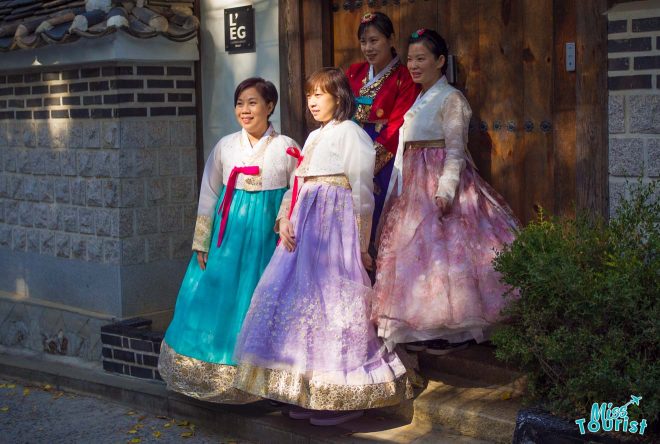
A hanbok is the traditional Korean dress that reflects historical Korean ideas, customs, and forms, all illustrated in the colors and shapes of the material.
You will see many people wearing this traditional attire, and I really regretted not knowing about it in advance! You can find stores renting hanboks everywhere between the Gyeongbokgung Palace and the Changdeokgung Palace. Once you have the dress on, you can walk around the palaces. By the way, it is pretty much the only place in the world where you can walk around in traditional clothes in the city and not look out of place!
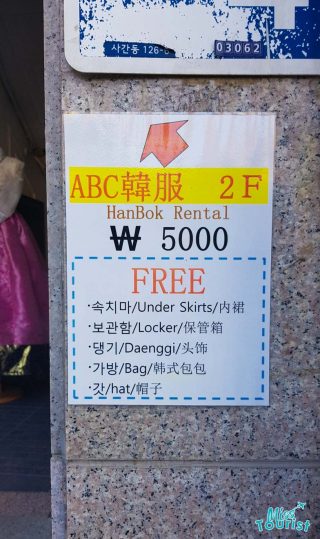
The hanbok rental can be from 1.5 hours to a full day and the prices range between 5,000 to 15,000 KRW (US$4 to US$14). You will find a lot of stores around the palaces!
If you are traveling alone and want to have double the fun while playing dress up, join this photoshoot experience right on the Palace grounds.
NOTE: There is a ticket package called “Royal Palace Pass” that includes the Gyeongbokgung Palace, Changdeokgung Palace, Changgyeonggung Palace, Deoksugung Palace and the Jongmyo Royal Ancestral Shrine for a price of 10,000 KRW (US$9). You can only purchase this ticket package at any of the palaces or the Ancestral Shrine ticket office.
PRO TIP: If you are wearing a hanbok you will enter all the palaces for free! They’ll still give you a ticket so they can track the number of people inside, but I repeat, you don’t need to pay for it!
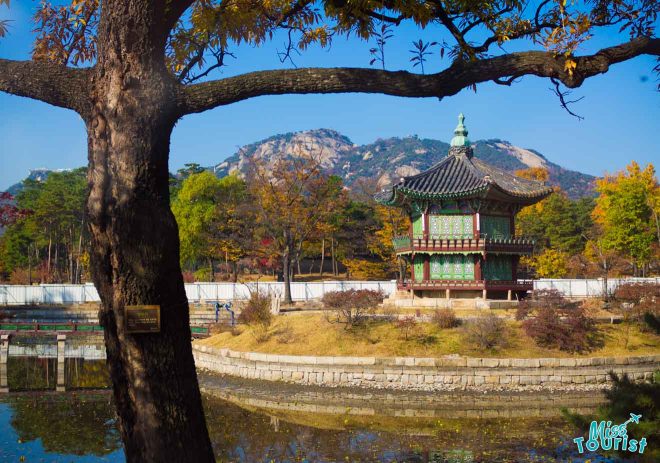
PRO TIP 2: The best time to go is around 9 AM when there are hardly any people! I was basically walking around the Palace alone; then, by 10 AM, it was already much more crowded. The Palace is huge, so it took me about 2 hours to explore the entire property without rushing.
PRICE: Entrance fee to the Palace is 3,000 KRW (US$3) per adult. You can book your online ticket here.
2. Go over to Bukchon Hanok Village
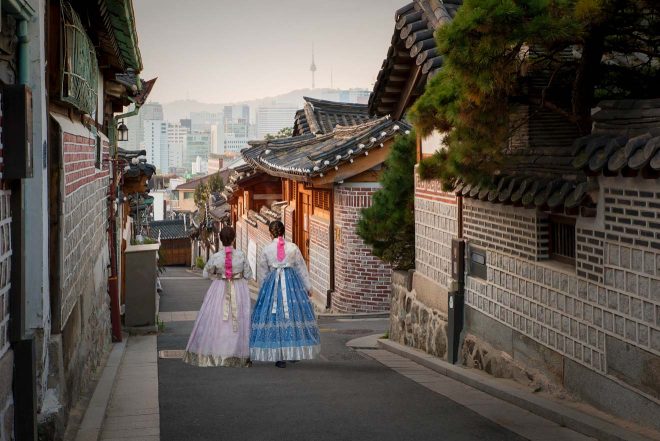
After the Palace, I headed over to the traditional Bukchon Hanok Village since they are so close to each other. This is a traditional Korean village and it’s name means “north village” because it’s located north of the Cheonggye Stream.
The village is filled with traditional houses called hanok, and it’s a very cute area where people still live! Some of these hanoks are used as cultural centers, restaurants, and guest houses so you can go inside and immerse yourself in the traditional Korean culture.
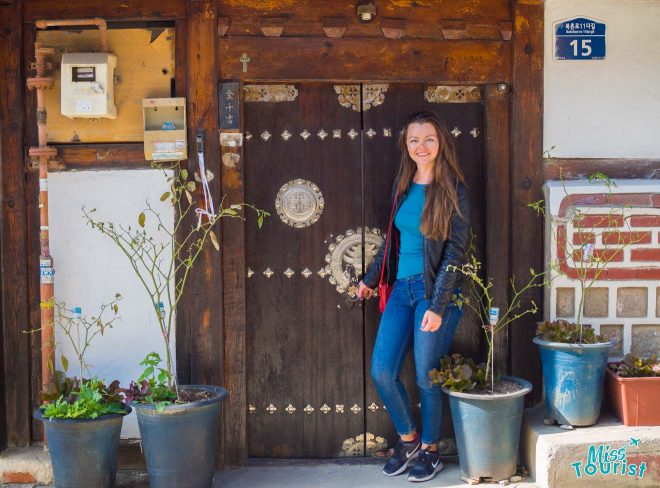
PRO TIP 1: I recommend stopping at the Tourist Information Center inside the village and picking up a map, then following the wonderful walking route that will get you to all the main points! You can also get a free map outside the Angok Station if you arrive by metro.
PRO TIP 2: For wonderful photos, again, you can use the traditional hanbok (the classic Korean dresses); you will see plenty of people doing so!
PRICE: Free
3. Head over to Myeong-dong for some shopping
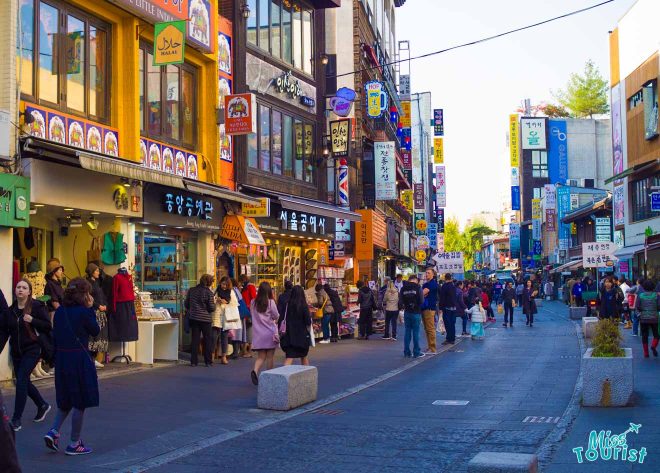
Myeong-dong is the go-to area for shopping and also one of the most popular shopping hubs of Seoul!
Walk along the Myeong-dong shopping street to find everything from the latest Korean cosmetic trends to all kinds of clothes and shoes you can think of!
You will find a diversity of retail stores, family restaurants with Korean, Western, and Japanese dining options, and you can even stumble across hair salons and banks there.
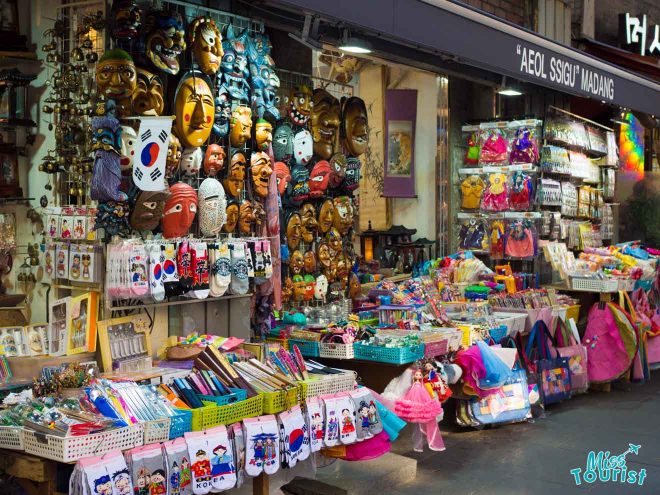
By the way, if you are interested in going for some Korean cosmetics, my brand suggestions are Missha, Tony Moly, Nature Republic, and Skinfood.
If shopping is not exactly your thing, I still recommend visiting this street. First of all, for people watching – because it is such a big part of Korean life, there is no better place to see the local culture in action! I think it was only more interesting to people watch in Harajuku in Tokyo! And secondly, it is worth visiting because of the many restaurants and food stalls where you can find some great local dishes!
Subscribe here to get up to 35% off your accommodation for your next trip!
4. Admire the lovely city view from N Seoul Tower
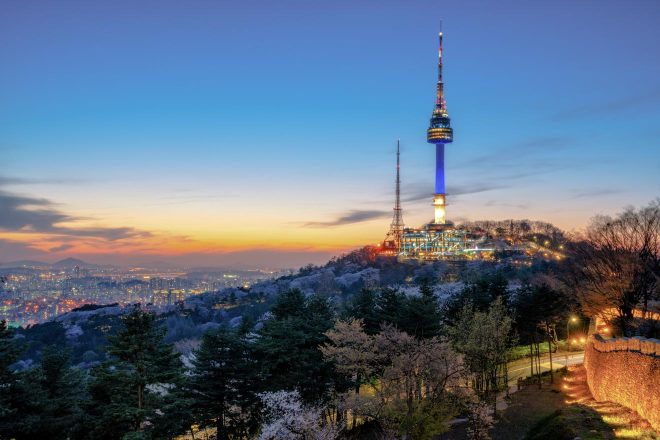
N Seoul Tower also known as Namsan Seoul Tower was initially built to broadcast TV and radio signals back in 1969, but has been opened to visitors and is now a local landmark of the city!
The view is very nice, but in my humble opinion it is only worth it if you go on a weekday. On weekends it gets so full of visitors you will feel like you are in a packed shopping mall where everyone wants to take a picture with the fake tower background, and you might even miss the show projected on the wall.
I went on a weekend and still remember how horribly long the line was to buy a ticket. That is why, if you really need to go on the weekend, I recommend going for a skip-the-line ticket; no need to struggle with transportation up the hill or fighting with the line. I used it myself!
At the Namsan Pavilion you can even find some cultural performances so check out the schedules here. The tower, pavilion, Baekbeom Square, and Namsan Cable Car are located at the Namsan Park, the largest park in Seoul.
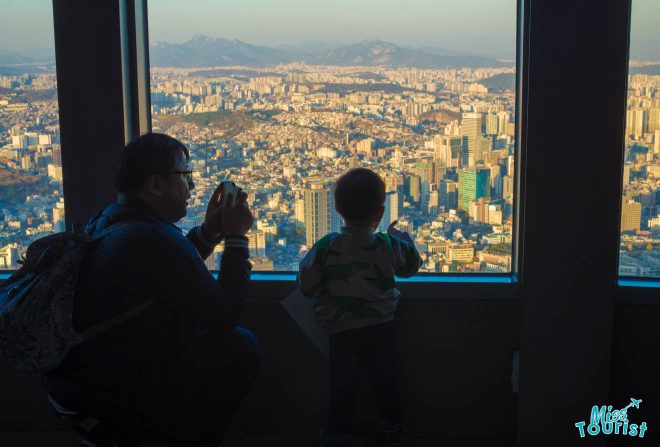
HOW TO GET THERE:
- You can take the cable car from Myeong-dong Station; the ride takes a few minutes and costs 7,000 KRW for a one-way ticket (US$6)
- You can also take the bus (No.02, No.03, or No.05 lines) for a price of 1,200 KRW (US$1).
PRO TIP: My suggestion is to take the cable car up and the bus down (though I remember I had to wait for the bus for about 20 minutes).
PRO TIP 2: I don’t recommend going on weekends because it’s too crowded to enjoy! Same applies for Seoul Sky.
PRICE: 11,000 KRW (US$9) on the official site, but 5,500 KRW (US$5) if you book here.
5. Visit Namdaemun Market, the locals’ favorite
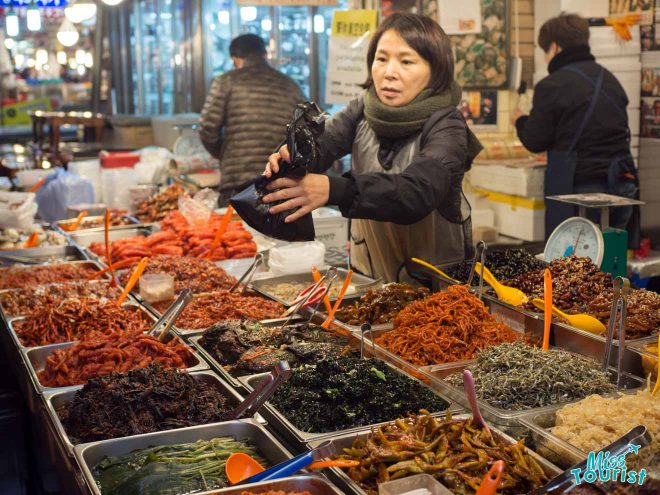
Yes, Seoul is all about markets, that’s why they are on my list!
Namdaemun Market is not the trendiest market, but it is the oldest and most traditional one. It opened in 1964 and it is found between City Hall and Seoul Station.
The market covers about 66,000 square meters where there are about 10,000 retailers, vendors, and wholesalers!
You will definitely find cheaper souvenirs here, but you can also find a diversity of products from food supplies to electronics which made me think it is more of a market for locals.
PRO TIP: Starting at 11 PM is probably the best time to visit the market when all the shoppers are going around looking for the best deals and sampling some of the street food stalls! By the way, just like finding your way around a new city, the best way to enjoy the market is by wandering through the maze of shops.
OPENING HOURS: The market is closed on Sunday
6. Visit and eat at a themed café
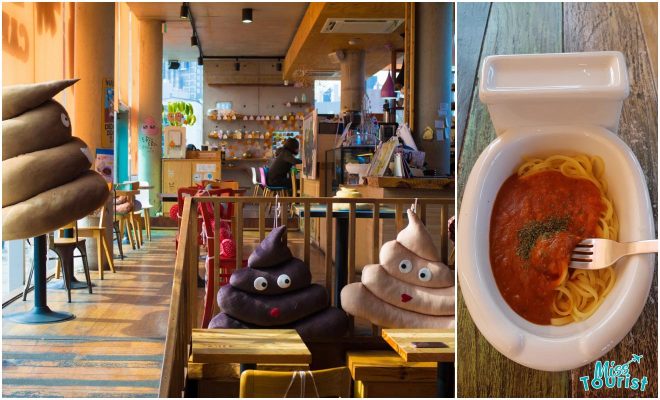
This is probably the most fun activity for anyone tired of going to the classic coffee shops!
You can get completely out of your comfort zone and head over to a themed café – Seoul has everything from cat and dog cafes to even poop cafes!
Below I will recommend a couple of great themed cafes in the city:
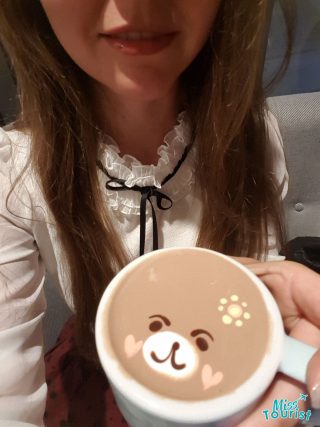
- Blind Alley Racoon Café – this one goes wild and welcomes raccoons onto the property! Plus, they also have pigs and a corgi that lives there!
- Ddo-Ong Cafe – this one has the craziest theme of them all – a poop theme! This place has decorations full of squat toilets and pooping dolls. Although the menu selection might not have the most appetizing names, it’s hilarious! It might be the most difficult to find; it is on the roof level (4th floor) of the Insa-dong’s Ssamziegil shopping complex.
- Banana Tree Cafe – it is a different cafe, where your cake is served in a plant pot and your spoon actually looks like a tiny shovel!
- Thanks Nature Cafe – this one is among the wildest cafes I’ve seen because you can actually have a drink while petting the sheep!
- Princess Diary – it is a fun and beautiful cafe where you can play dress up with gorgeous dresses and feel like a princess while having coffee in their fairytale areas.
- 221 B – Sherlock Holmes-themed cafe in Gangnam neighborhood
7. Take a tour around Changdeokgung Palace
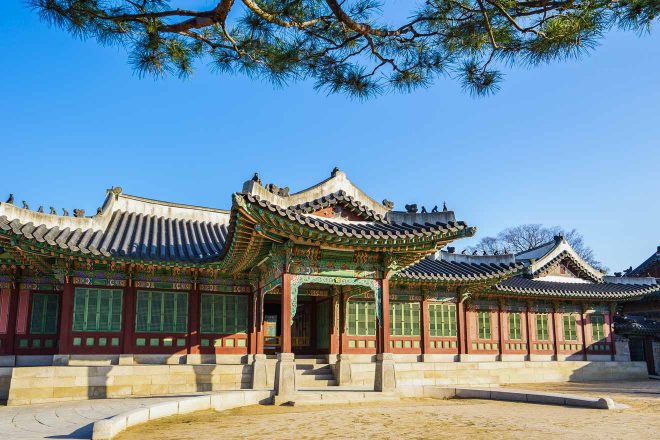
The Changdeokgung Palace (also known as Changdeok Palace) is part of the Five Grand Palaces made by the Joseon Dynasty Kings. But just like the other buildings, this palace suffered structural damage during the Japanese occupation.
The rear garden at the palace was done to create the ideal resting place for the royal family members – I definitely recommend checking it out!
PRO TIP: You can book an inexpensive tour with a local and ask for specific Seoul attractions you want to visit; they will gladly give you the tour and share some knowledge about the place.
NOTE: As I mentioned earlier, there is a ticket package called “Royal Palace Pass” that includes the Gyeongbokgung Palace, Changdeokgung Palace, Changgyeonggung Palace, Deoksugung Palace and the Jongmyo Royal Ancestral Shrine for a price of 10,000 KRW (US$9). You can only purchase this at any of the palaces or the Ancestral Shrine ticket office.
PRICE: Palace building entrance is 3,000 KRW (US$2.50). Book your online ticket here or purchase a ticket at the gate.
8. Buy some Korean beauty products
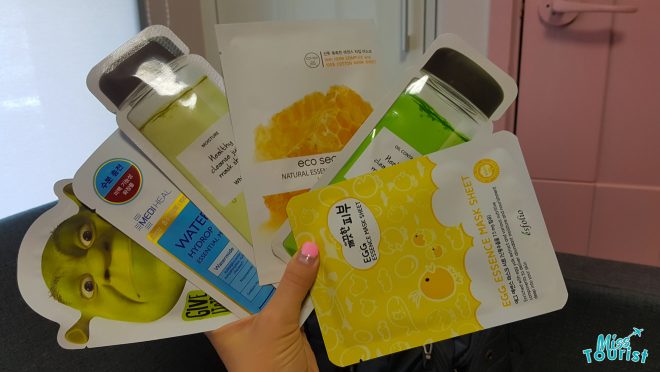
Girls, this is paradise! Korean cosmetics are known to be the best in the world, and it is crazy cheap to buy them here in the motherland!
Being a travel blogger who is continuously on the road, I hardly buy anything other than a magnet, but I couldn’t help myself and following the craziness bought many cute things in Seoul. Seriously, how can you not? So my advice is to bring some extra cash for that!
PRO TIP: If you are staying a couple of days in the city, I would first buy samples, try 2 or 3 and figure out the ones your skin likes the most, then buy a huge box of it (it’s cheaper if you buy in big quantities!).
From my experience, I can recommend some good stores to shop for beauty products such as Olive Young, Nature Republic, Banila Co, and Skinfood. They sometimes give you free samples so that you stop and maybe buy something, no obligation.
PRO TIP 2: Don’t forget to ask for your tax refund form. You will be able to get 10% of the cost of your purchases back at the airport, so save the receipts!
9. Go to Insa-dong if you love souvenirs and traditional crafts
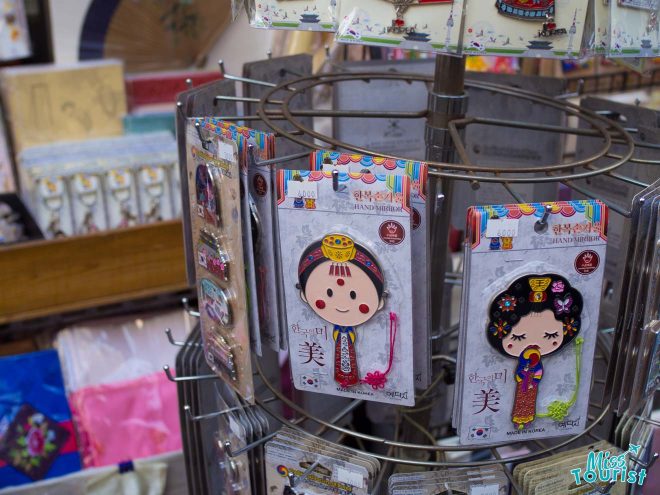
Insa-dong is another great option for shopping for souvenirs and traditional crafts. Head over to this street for the antique shops and art galleries that offer a selection of pottery, antiques, and unique souvenirs.
If you are feeling hungry and you aren’t in a shopping mood, there are plenty of food options here as well! The street food is probably Insa-dong’s best attraction!
Insa-dong Street has many alleys and smaller streets that branch from it which create a street food paradise with food carts all along the way. You will find many options for dumplings, hottoek, and local corn cookies filled with ice cream.
By the way, all the districts I mention in this article are in the city center, so walking from one to another takes no more than 15 – 20 minutes.
10. Visit Gangnam district
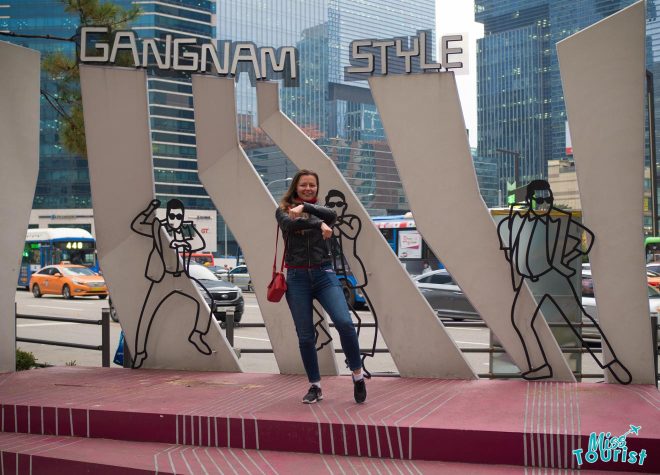
This name sounds pretty familiar, right?!
This district is the third largest in Seoul! Gangnam is located close to River Han and its name actually means “south of the river”. It is a fashionable district in Seoul that became famous worldwide thanks to PSY and his “Gangnam-style” song. This “gangnam style” refers to the district’s lifestyle where the people are fashionable, trendy and they like to give off a certain “air”.
FUN FACT: There is a spot at Gangnam Station where you can see people dancing to this song while being recorded and projected on a big screen.
Gangnam has become a ritzy district with a high price tag and with many upscale shopping stores, restaurants, and nightclubs. Go along the busy shopping area for some shopping or just to window shop. If you are only looking for a quiet space, you can head over to Bongeunsa Buddhist Temple which is an oasis of calm, or maybe Samneung Park for some relaxation!
11. Relax at Cheonggyecheon Stream
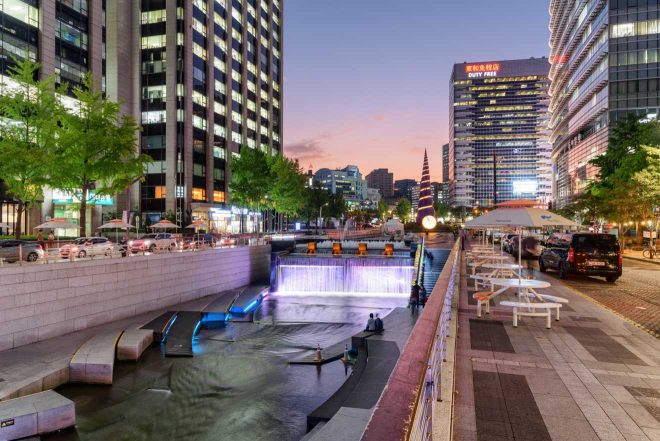
Cheonggyecheon used to be a neglected stream covered by an elevated highway after the Korean War, but is now part of a modern urban park! The entire stream is about 11 km long – it goes from Cheonggye Plaza under a total of 22 bridges before meeting Hangang River.
I stayed near the stream in the city center and was really impressed and enchanted by the view while walking right next to the stream! While you’re there, you can also go to Cheonggyecheon Museum that shares the story of the stream with a scale-model of it and old photographs.
12. Try some Korean BBQ
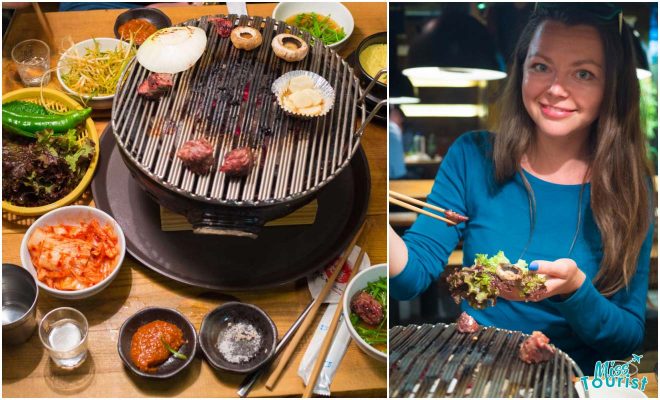
Korean BBQ anyone? Yes, please!
If you’ve never heard of or tasted Korean BBQ before, let me explain it! The amazing part of this dish is that in most restaurants you will get your own personal grill on the table. The server brings the meat you ordered (we ordered pork and beef, for example) and you put it on the grill together with some mushrooms and onions.
You will have many other little plates on the table around the grill such with items like kimchi (cabbage), salad leaves (for you to wrap your meat in), marinated sliced garlic, soups, sauces, and salt.
The food was absolutely delicious! I just had a flashback of that great meal while typing. I definitely recommend you to try this, unless you are a vegetarian.
The most popular version is called bulgogi (sliced marinated beef sirloin) or galbi (marinated beef short ribs).
Maple Tree House is a fantastic place to try the best Korean BBQ in the city! Although they have a variety of Asian dishes, their BBQ is still a highlight. Their most famous version is the one with hanu (Korean beef) cut in thin stripes.
FUN FACT: You can store your clothes (jacket etc) in a special plastic bag while you eat so they don’t smell like BBQ afterwards.
13. Discover the cool stuff at Dongdaemun Design Plaza
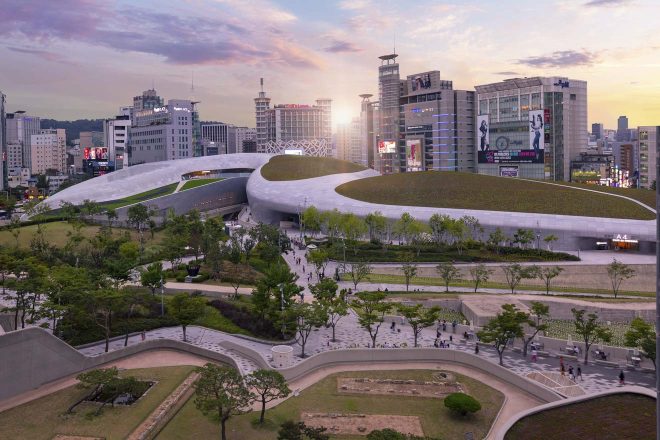
Dongdaemun Design Plaza (DDP) is a major development landmark built with a neofuturistic design that has become the city’s fashion hub!
There are maaaaany shopping malls and markets in this area that form a district.
Make sure to walk inside the Design Plaza where you will find the coolest and most unusual stuff such as a walkable park on the roof! Some shops might be a bit pricey, but you can always go inside for some window shopping only!
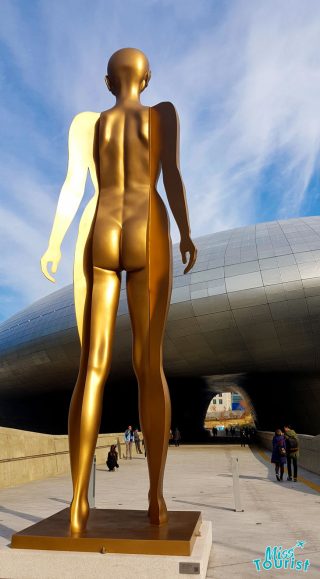
The building is divided into five halls, each with a different purpose:
- Art Hall – there are numerous conventions, exhibitions, fashion shows, and concerts there
- Museum Hall – you can find a design playground, a museum, and an exhibition hall there
- Design Lab – works as an incubator for local and international product designers.
- Design Market – convenient for some late night shopping
- Dongdaemun History & Culture Park – the park shows what the area used to look like during the military training of the Joseon dynasty.
14. Admire Deoksugung Palace
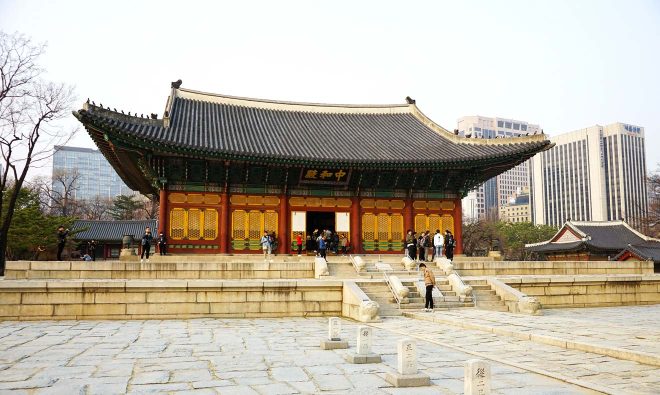
Deoksugung Palace started out as a royal family house but was named a palace after the main palaces had been destroyed during the 1592 Japanese invasions.
By the way, Deoksugung Palace means “palace of virtuous longevity”!
The Palace is divided into three main halls, each with a different style and purpose:
- Jeonggwanheon Hall – the first extension to the palace and King Gojong’s favorite place to spend his free time. The back of the hall included a secret passageway to the Russian Emissary, and is still in existence
- Seokjojeon Hall – a Japanese art gallery opened to the public. It also holds the palace treasure exhibition and the National Museum of Modern Art
- Junghwajeon Hall – the base for all political discussions and national affairs during the Korean Empire.
PRO TIP: Don’t forget to stop by the Daehanmun Gate to see the changing of the Royal Guards, everyday at 11 AM, 2 PM, and 3:30 PM (except Mondays).
You can check out the Palace with a free guide service (there is no option to book, but you can check the tour schedule here) to actually understand what you are admiring.
OPENING HOURS: Tuesdays through Sundays from 9AM to 9PM. Check the updated opening hours here.
PRICE: Entry fee to the palace is 1,000 KRW (US$1), pay it at the entrance
15. Go to Noryangjin Fisheries Wholesale Market
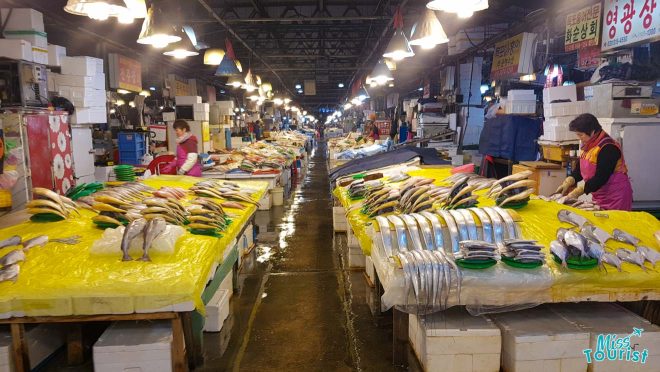
Noryangjin Fisheries Wholesale Market is Korea’s largest seafood market!
The trade of marine products in this market amounts to about 250 to 300 tons every day! There are about 700 fish retail stores in this six-story building! Most retail stores and auctioning activities are found on the 1st floor, and the salted fish stores and raw fish restaurants are located on the 2nd floor.
You will only get quality products and service when buying fish there, and you can be sure of this because the merchants will ask how long it will take for the fish to reach the fridge so they know how to pack the fish to avoid spoiling.
If you do not want to buy an actual fish (which is clearly understandable as you are probably going to stay in a hotel), there are some nice restaurants upstairs where you can either choose something from their menu (the fish is from the market), or bring them the fish you bought and ask them to prepare it for you.
16. Relax in a Korean Spa
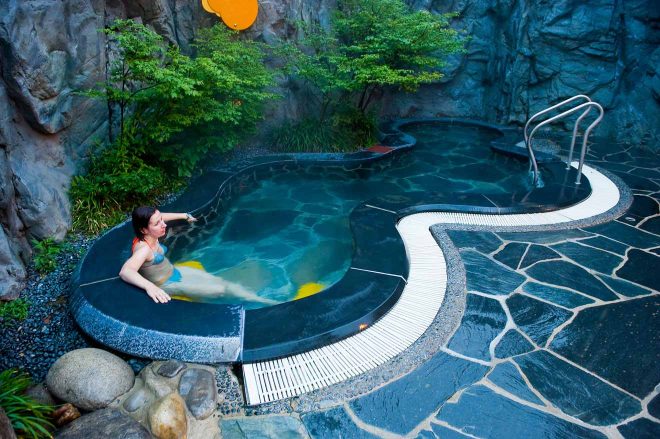
How can a Korean spa differ from any other spa worldwide? Only one word – jjimjilbang!
Jjimjilbang means “bath house”, and comes from the word “Jjimjil” which means heating. A jjimjilbang consists of gender-segregated public baths or saunas mostly frequented by locals, but you can definitely go there if you want to unwind after a full day of walking and shopping.
In most of these spas you can find traditional kiln saunas, massage tables, and hot tubs, as well as heated salt rooms, ice rooms, and sleeping quarters. Another great idea is going for a seshin, which is a full body scrub that has to be booked with the “room manager” who will let you know when it is your turn.
Most of these jjimjilbangs are open 24 hours and have a lot of visitors on the weekends.
Okay, but how can you choose a good Jjimjilbang out of all the choices? It’s not easy, but I handpicked a couple of options for you:
- Dragon Hill Spa & Resort – one of the best in Seoul because of the service and facilities! They have a spa, sauna, golf course, KTV, and cinema.
- Itaewon Land Sauna is a less touristy Jjimjilbang. You can find a big traditional oak wood sauna with a 300 m underground spring of water there.
PRICE: about 8,000 – 16,000 KRW (US$7 – US$14)
17. Visit the colorful Leeum, Samsung Museum of Art
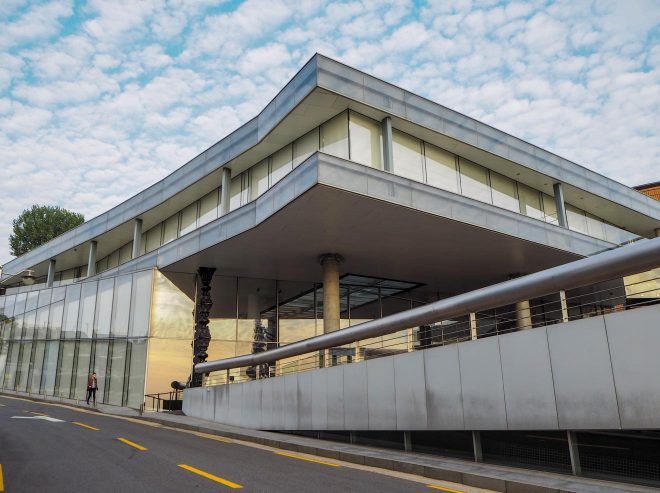
Leeum is an art museum created and run by the Samsung Foundation of Culture. Museum 1, designed by the Swiss architect Mario Botta, houses the traditional Korean art exhibits ranging from classic ceramics and porcelain to Buddhist art and sculptures. Meanwhile Museum 2, made by French architect Jean Nouvel and Dutch architect Rem Koolhaas, has modern and contemporary art elements from Korean and international artists.
GUIDED TOURS: Everyday at 10:30AM and 13:30PM. No booking required.
PRICE: 10,000 KRW (US$9) for the Museum, free for the guided tour. You can purchase a ticket at the Museum entrance or free entry is included by using the Seoul Pass (see more in the additional information section).
18. Have some fun at the Alive Museum and Dynamic Maze
Alive Museum is a 4-D art museum in Korea that combines 3-D paintings and objects that create optical illusions. You can find the tricks behind the painted illusions and even be a part of them. Get your camera ready for this display!
Dynamic Maze is an indoor maze where visitors have to beat challenges and obstacles to reach the finish line! Are you ready to solve the puzzles?
NOTE: Both Alive Museum and Dynamic Maze are two different activities found at the same place.
I recommend you purchase a ticket for both attractions for a convenient fee of 15,000 KRW (US$13), which you can purchase here.
PRICE: 12,000 KRW (US$10) is the price on the official site. But I suggest you buy this ticket that I found cheaper than the official ones (US$8)
BONUS 1: 13 Extra things to do in Seoul
If you are, like me, staying in the city for longer than 3 days, don’t worry, there is an endless amount of things to do in Seoul. I don’t think you would get bored even after a month!
Here are the extra things I would highly recommend visiting:
1. Walk around Itaewon district
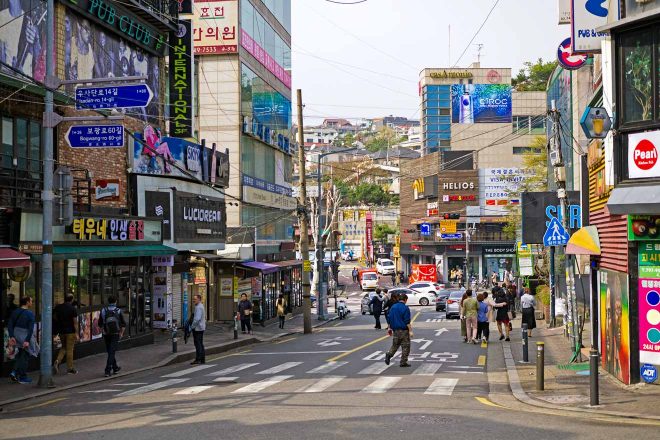
This district is the area where most expats prefer to live, which means you’ll find a great variety of international cuisines and stores here! I recommend stopping by C. Through Café, a great coffee place with coffee art. You will get masterpieces served on your coffee foam and yummy desserts that complete the afternoon snack!
If you want to mix your meals a bit, this is your perfect destination because it has restaurant cuisines from all over the world: Spanish, Italian, Brazilian, Indian, Russian, Chinese, Japanese, Middle Eastern, Canadian, Mexican, Turkish. You name it – you’ll find it!
Guess what other activity is also insanely recommended here… that’s right: shopping!
What about the nightlife? Most of the clubs have hip-hop music, and Owl Lounge is probably the top recommended option for locals and foreigners. Another great trendy club where you can even see some foreign artists is Cakeshop (it’s a bit smaller and it always has a full house!).
2. Learn about the past at the war memorial of Korea
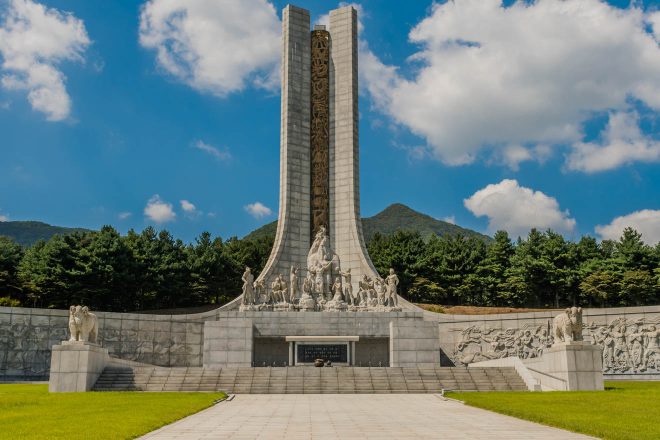
The War Memorial of Korea is an interesting stop on your city tour; you will see all the military equipment and the actual war memorial monument that serves as an educational venue. The memorial was created to commemorate the patriotic martyrs’ noble sacrifice back in 1994.
The museum has about 33,000 artifacts and one-third of these are on display in the indoor and outdoor exhibition halls. Both indoor and outdoor halls have different exhibits.
It is a great place for kids and adults to learn about the Korean War!
PRICE: Free
3. Pass by the Banpo Bridge
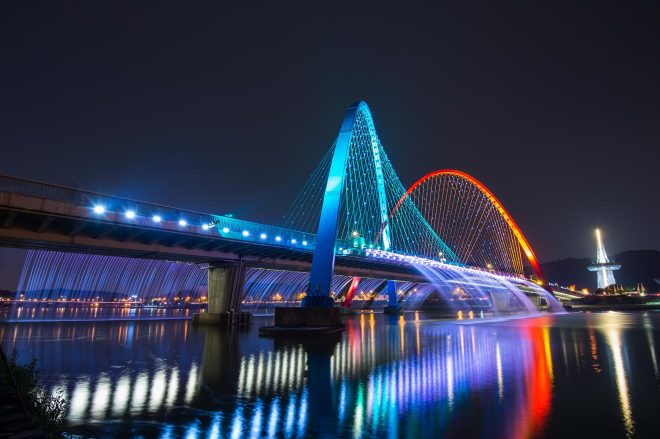
Banpodaegyo or Banpo Bridge is a two-tier bridge over the Han River that connects the districts of Seocho and Yongsan. Most people head to the bridge for the Rainbow Fountain show. The best location to watch it is from Banpo Hangang Park!
The Moonlight Rainbow Fountain, that can be viewed from the bridge, has over 380 water jets and multicolored lights in a show that can be seen from April to October. On Saturdays you can find the “Moonlight Square Cultural Weekend” where there is a performance of different musical styles from contemporary, acapella, and jazz, to orchestras.
OPERATING HOURS: The Fountain show takes place everyday at 12PM, 7:30PM, 8PM, 8:30PM, and 9PM. Check the updated schedules here.
PRICE: Free
4. Discover the ceremonial Jongmyo Shrine
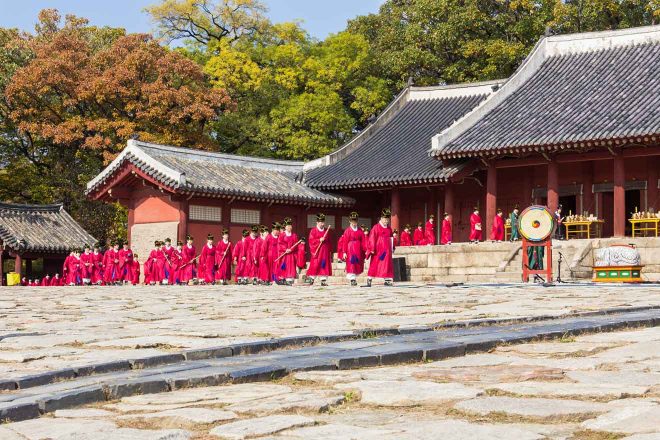
Jongmyo is the oldest supreme shrine where the locals would worship the Joseon Dynasty kings. It has been used since the 16th century and has tablets with the teachings of all the royal family members.
To visit the Shrine, you can join a free guided 1-hour tour on weekdays, every 2 hours, starting at 10am (available in English as well). These are only available to foreigners and although you can’t book them beforehand, you can see their schedule here.
NOTE: There is a ticket package “Royal Palace Pass” that includes the Gyeongbokgung Palace, Changdeokgung Palace, Changgyeonggung Palace, Deoksugung Palace and the Jongmyo Royal Ancestral Shrine for a price of 10,000 KRW (US$9). You can only purchase this at any of the palaces or the Ancestral Shrine ticket office.
NOTE 2: You can only visit the shrine without a tour on Saturdays.
PRICE: Shrine entrance fee is 1,000 KRW (US$1) per adult. Check the updated price here.
5. Uncover shopping gems around the city
1. Ewha Shopping Street
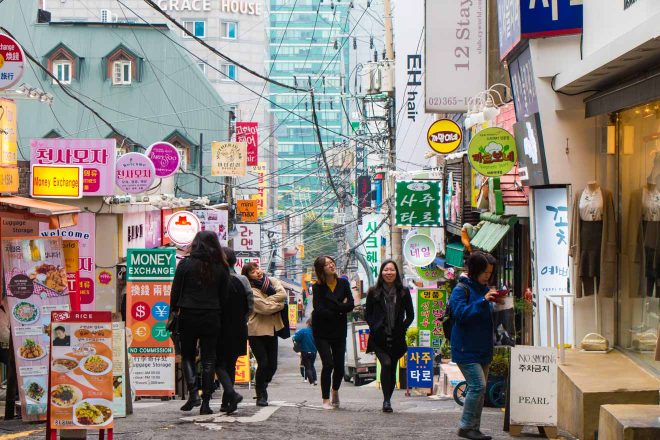
Ewha shopping street is a hidden gem in the city!
The street is right around Ewha Womans University, so most of the things are aimed at students. Most of the stalls in the area sell fashion items like clothing, shoes, and accessories for young women.
You can go there for some cheap shopping and a fun Korean manicure if you have the time! I enjoyed my shopping there; you can buy very interesting things for less than US$10.
NOTE: The downside is that you cannot try on many of the clothes, so even if they have fitting rooms they won’t let you try on some of the items. (I could try on the coats and sweaters with no problem, but I think most stores said “No” to trying on dresses.)
2. Hongdae shopping streets
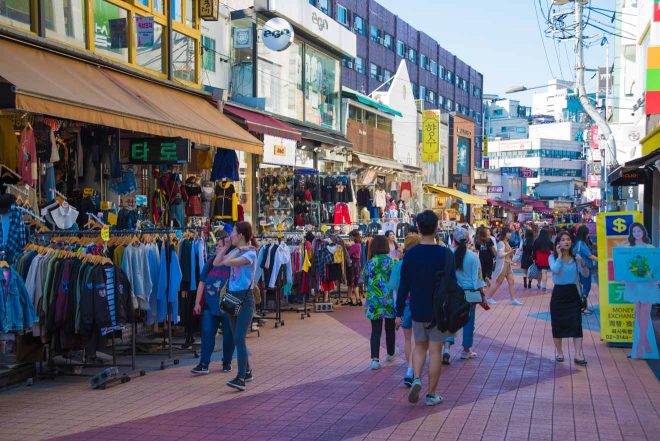
Hongdae neighborhood is mostly known for its underground culture, the freedom of self-expression, and the youthful vibe. There are many cafes, cozy art galleries, fashion shops, gourmet eateries for all foodies, and live clubs making it a common and frequented meeting spot for local and foreign young people.
There are also many street performances and local festivals that awake the spirit in the district and keep it going through people and energy throughout the streets.
3. Common Ground
Common Ground is an out-of-the-ordinary shopping mall, built with 200 shipping containers making it the first and biggest container mall complex in the world. It was created with the stacked containers to make better use of the area and also to draw triple the attention of people walking by.
The stores have products for every taste, from budget clothes for women in their 20’s, small local brands, and boutique brands, to a fun section of food trucks for a unique dining experience.
6. Cruise by the Hangang River
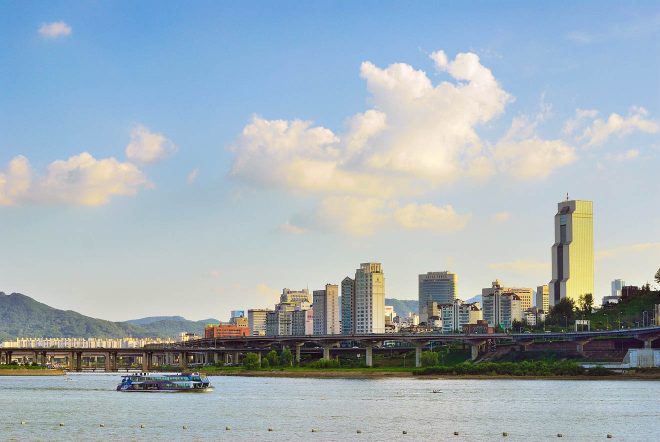
You can see a different side of Seoul while discovering the city in the evening with this nice 4.5- hour Hangang River Cruise. You can even enjoy a live guitar performance while taking in the spectacular sunset and the main sights of the city!
After the cruise you will all head towards a bus that will take you to Mount Namsan at the N Seoul Tower, perfect to enjoy the panoramic view. And the best part is… you don’t need to worry about transportation; it’s all handled for you!
PRICE: 50,000 KRW per adult (US$42)
7. Go by the Gwangjang traditional market
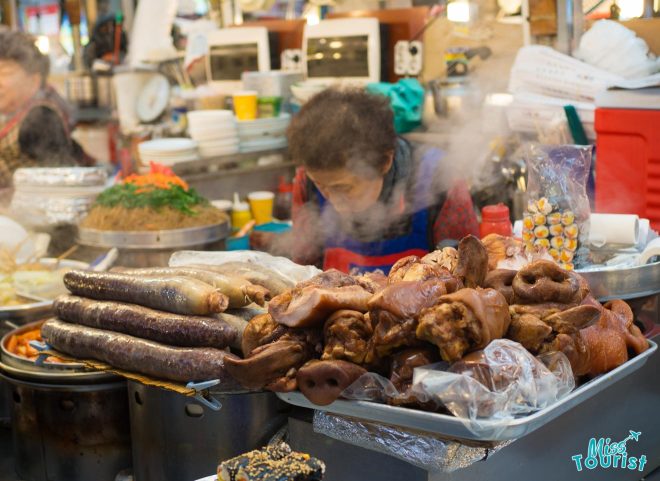
Gwangjang Market used to be the Dongdaemun Market and it is one of the most traditional street markets in the district of Jongno-gu! Because it is one of the oldest in town, it is probably also the largest with 5,000 stores. Over 65,000 people visit the market each day!
The market is mostly known for its variety of stores that have really good quality silk goods, linen bedding, hand-made products, and vintage shops. The vintage arcade has a unique design and it attracts many young people, including famous local celebrities.
And like most markets, you can’t forget about the street food here!
8. See history and archaeology at the National Museum of Korea
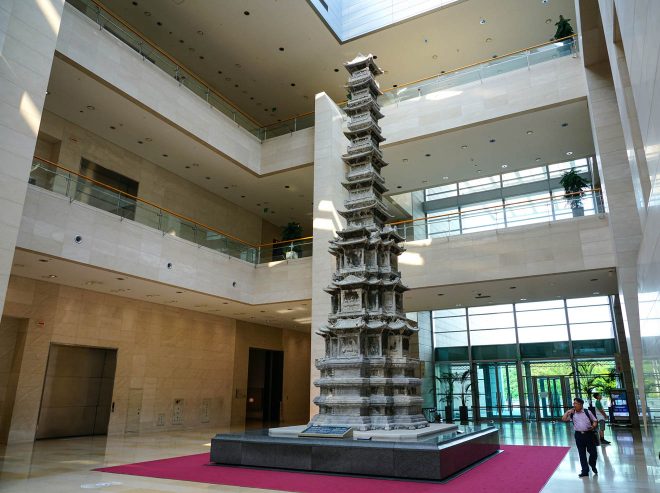
National Museum of Korea has been a center of studies and research of Korean history through archaeology, history, and art. It houses the greatest artifacts to tell Korea’s fascinating story from ancient eras to modern ages.
The museum is divided into a Main Exhibition Hall and a Children’s Museum, with galleries holding many national and international pieces. Throughout the year, there are different educational events and cultural programs that visitors can be part of; you can see the updated program here.
PRICE: Free
9. Go for skyscraper views at Seoul Sky in the Lotte World Tower
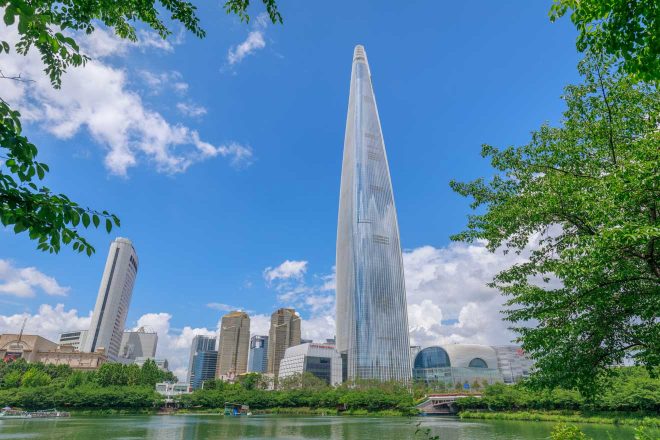
Lotte World Tower is a local 123-floor skyscraper, an architectural gem in Korea and a symbol of how the city is a mix of traditional and modern!
As part of the Tower you can find Lotte World Mall, perfect for shopping, Lotte World Aquarium, and the largest Lotte Duty Free store.
The lovely Seoul Sky (an observation deck soaring above you at 500 m) is also located there and it offers a panoramic view of the whole capital; you can enjoy it by day or by night!
To get to the observation deck you need to take the Sky Shuttle on the inside of the Lotte World Tower, which can reach a speed of 600m per minute. The shuttle ride is included in your Seoul Sky ticket.
PRICE: Free to enter the Tower / 27,000 KRW (US$23) per adult for Seoul Sky on the official website. I recommend this cheaper option for the same ticket here (US$17).
10. Find traditional houses at Namsangol Hanok Village
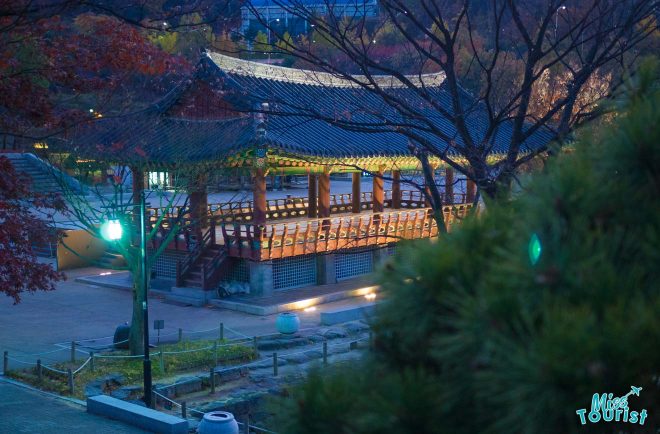
Namsangol Hanok Village is found on the north side of Namsan Mountain. Here you can find some traditional Korean houses, a traditional garden, and even a time capsule plaza (they buried a capsule with cultural objects to be opened on Seoul’s 1000th anniversary in 2394!). The traditional houses surrounded by the beautiful garden and pavilion will help you forget about the busy city noises. It is so peaceful you won’t even realize you are still in the city!
Five hanok houses in the village were redone to represent common houses from the different social classes during the Joseon Dynasty. But to protect these artifacts, only one of these houses is open for public visiting, the Yoon-ssi of Okin-dong, which is decorated as a tearoom so you can have a cup of traditional tea while gazing at the interiors.
If you want to visit the village as part of an organized tour, I recommend going for this tour that includes Gyeongbokgung Palace, N Seoul Tower, and Namsangol Hanok Village.
PRICE: Free
11. Make your way around the National Folk Museum of Korea
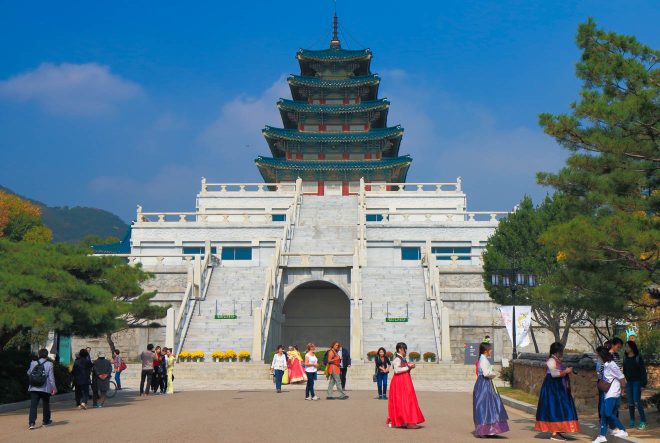
The National Folk Museum of Korea is found inside the Gyeongbokgung Palace and houses a diversity of pieces that used to be part of Korean daily life. There are also some educational and cultural demonstrations to help you understand and somehow feel part of the traditional Korean lifestyle!
For a tour around the museum you can go for the Audio guide rental that costs 1,000 KRW or make a phone-reservation for a free guided tour. You can find the tour contact here.
PRICE: Free
12. Discover new flavors with a cooking tour
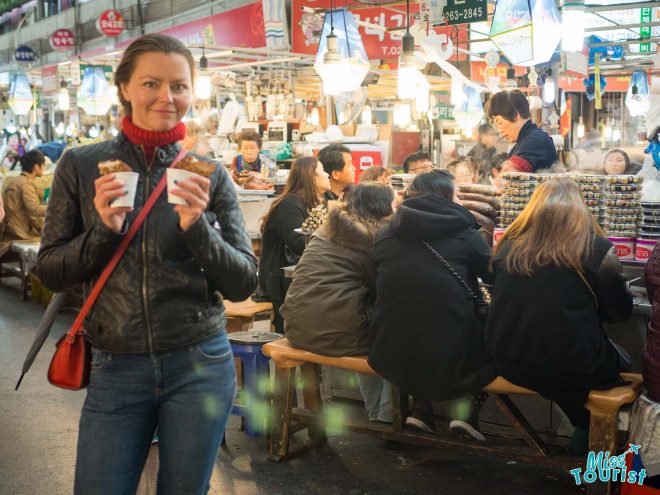
If you are tired of walking around the city, why not take a cooking tour and learn how to make traditional Korean food?
For example this 3-hour cooking tour will start with a walk through the best local markets to purchase some fresh Korean ingredients for the classic recipes you will make. Then you will head to a traditional Korean house where you will be taught step by step how to make some of the best Korean dishes!
PRICE: 68,000 KRW (US$57)
13. Walk along Seoullo 7017
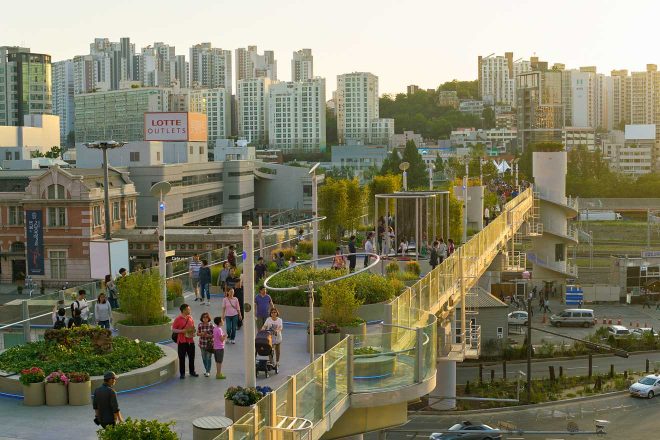
Seoullo 7017 is also known as Seoul Skygarden or Skypark and is an elevated park above a highway overpass. It was created due to so much traffic congestion, so this was to be a public park where pedestrians could move along.
14. Take a break at Starfield Library
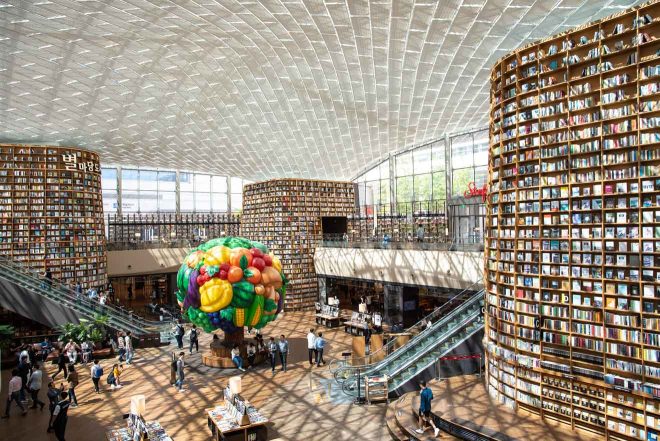
Starfield Library is located in COEX Mall, in Gangnam district. It’s a public library, open to everyone that wants to visit it. I recommend going there to take a break, unwind, take a look at all the books (they have tons of foreign books as well!), magazines, and more. There are also some events taking place there from time to time, you can check them out on their website.
BONUS 2: Must-try food in Korea
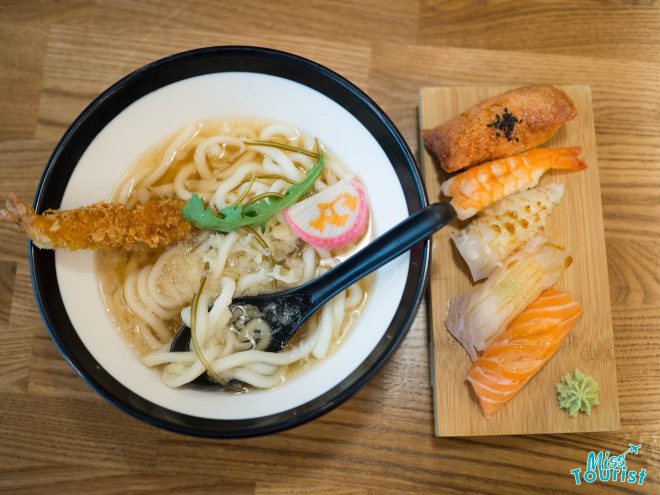
When ordering food, if you don’t want it spicy (and the food can be pretty spicy over there, trust me!), just say “An mepke djusae”.
If you are wondering what foods you should try in Korea, know that there is a great range of options and it will be so hard to choose! I have previously mentioned a couple of unique places where you can go have a cup of coffee and a BBQ, but I wanted to share more local dishes that you should try on your walk around the different markets.
Is food in Korea expensive? This will only depend on which restaurants you want to go to, but it’s actually cheap to try local dishes at food stalls and markets!
NOTE: I remember I faced some difficulties finding the dishes I wanted to try! I knew the name in Korean (for example, Gimbap), but on the menu it would give the translation of “rolls” in English. You can ask the staff about these names, they’ll be happy to help!
Here are the Korean names, so you can match and understand what it is you want to try:
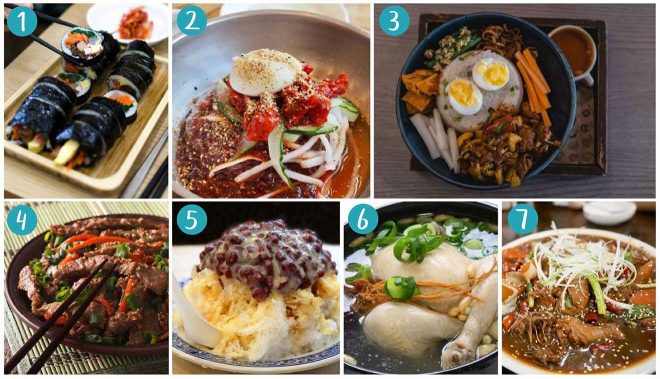
1. Gimbap are Korean rolls, really tasty and cheap! They can be found almost anywhere and they’re super similar to the Japanese maki rolls, so basically cucumbers, eggs and carrots wrapped in rice rolls.
2. Naengmyeon – literally means “cold noodles” in English, and they are noodles served in a cold soup. If you go for a Mul Naengmyeon you will get a South Korean sweet version of the dish; if the restaurant mentions the recipe is North Korean style, it will not be sweet.
3. Bibimbap – one of the most traditional dishes, meaning a literal mixture of types of rice. Once ordered you will get a bowl of warm white rice with some seasonal vegetables (namul) and chili pepper paste (gochujang) on top, as well as a fried egg or sliced meat.
4. Bulgogi – it means “fire meat” and it is a roasted dish of marinated slices of beef or pork, usually cooked on a barbecue or stove-top griddle.
5. Patbingsu – a classic Korean dessert, most popular during the summer. It is a bowl of shaved ice decorated with fruits, sweet red beans, rice cake pieces and topped with sweet creamy condensed milk.
6. Samgye-tang (Korean Ginseng Chicken Soup) – a rich soup that uses a whole chicken and is filled with rice, garlic, jujube, and ginseng. Mostly recommended for a healthy body.
7. Jjimdak is the Korean style braised chicken, a popular dish that combines savoury, a bit of salt and sweet, while having an extra subtle spicy touch.
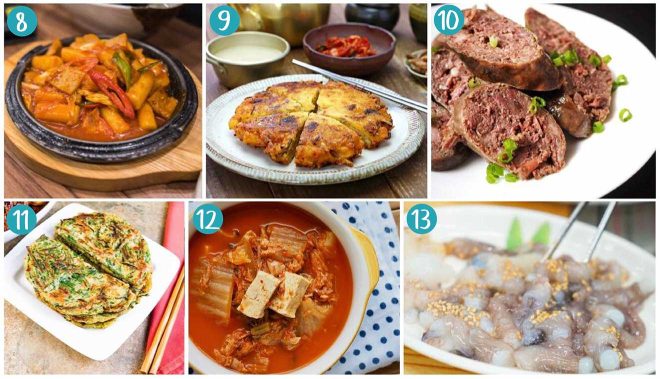
8. Tteokbokki – spicy rice cakes that you will find most frequently at the food stalls. They are soaked in a hot pepper sauce and stir-fried.
9. Bindaetteok – mung bean pancakes that combines soaked mung beans with vegetables and meat, all pan-fried in a circular shape.
10. Sundae or soondae – a kind of Korean blood sausage.
11. Haemul Pajeon – a Korean seafood pancake, a great combination of seafood, green onions and a savory pancake batter. It is usually served with some makgeolli or soju.
12. Kimchi jjigae – a spicy stew that you will always find in any typical Korean household. It is made with scallions, onions, tuna, and seafood.
13. Sannakji – live octopus! This is only if you are up for a really wild treat!
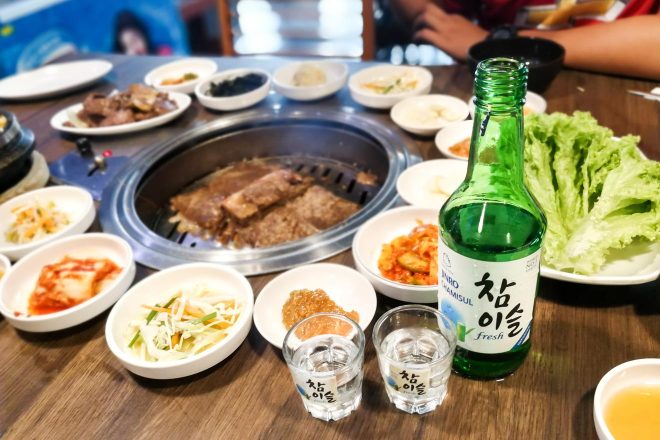
Local beverages:
- Soju – a colorless beverage whose alcohol content varies from 16.8% to 53%. It is made from rice, wheat, or barley.
- Makgeolli – a milky and slightly sparkling rice wine that tastes sweet and bitter at the same time. Compared to Soju, it has a low percentage of alcohol and it is very often the beverage for meals.
- Milkis – a soft drink that combines the traditional corn syrup, sugar, and carbonated water, with an extra pinch of milk to give a creamy taste.
- Bubble tea – it’s a known Asian black tea beverage with tapioca balls. If you never tried it before, you must!
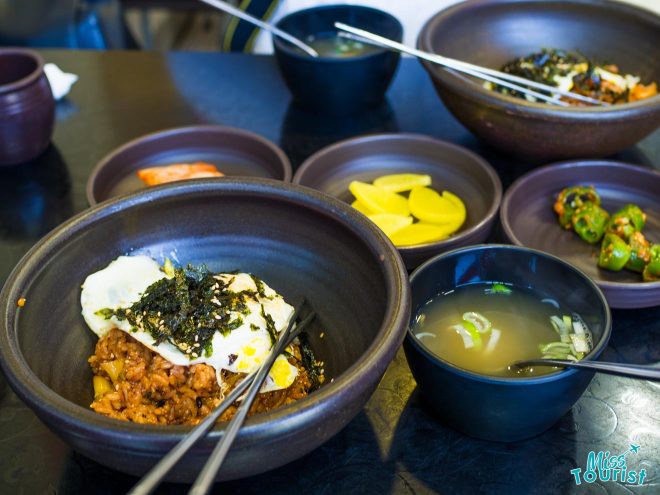
Great restaurant recommendations:
There are soooo many options for good restaurants in Seoul, but here are some of the best recommendations:
- Grandma Yu’s Bibimbap (Jeonju Yuhalmeoni Bibimbap) has been running for over 40 years by Grandma Yu herself, and their bibimbap is said to be among the most authentic and delicious in Korea!
- Mugyodong Bugeokukjib is a curious option if you are up for a gastronomic adventure. They serve only one local dish per day, there is no menu and the meal comes with many small side dishes to combine with the main bowl!
- Tosokchon is an authentic Korean food restaurant to find the best ginseng chicken soup.
- Pojangmacha – not a restaurant but a dining experience. You will be inside a small tented space that offers Korean street food and local alcoholic beverages. You will get a great variety of easy eating treats like tteokbokki, soondae, or mandu, all with a glass of beer or makgeolli.
BONUS 3: 4 Day trips from Seoul
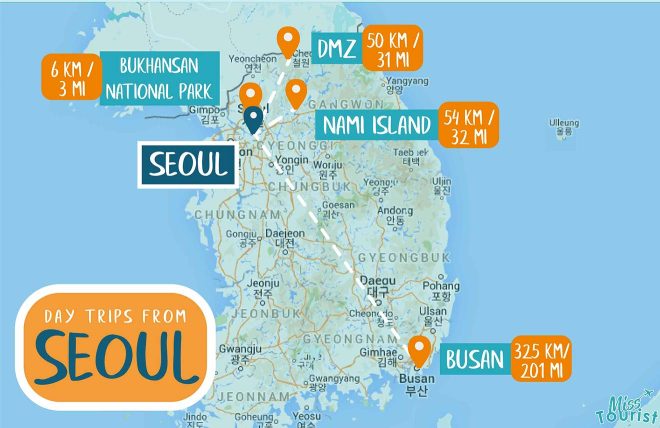
In case you have more time on hand, here are the places I recommend you check out, located close to Seoul:
1. DMZ (Demilitarized Zone)
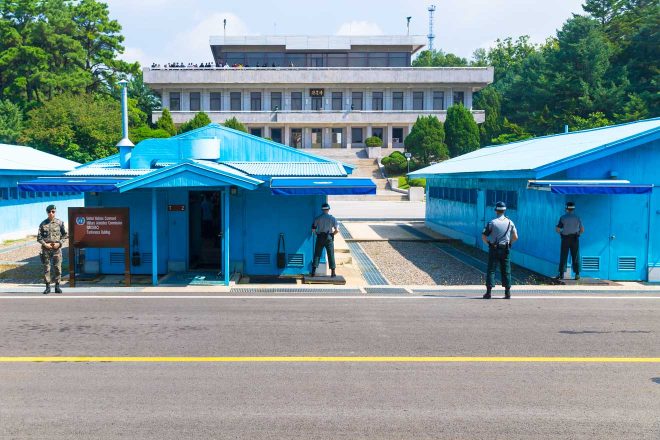
If you want to understand the current situation between North and South Korea better, this is one of the top things to do during your Seoul holidays!
DMZ stands for Demilitarized Zone and it is the biggest one in the world! Part of the DMZ territory is the JSA (Joint Security Area), the place where the two sides of Korea have met and interacted since 1954 and where most of the country conferences take place.
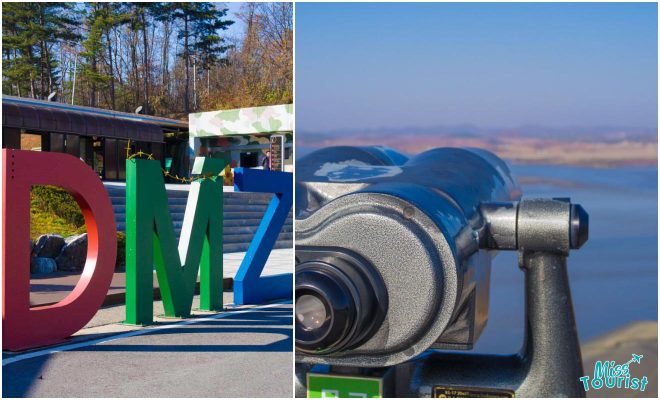
I recommend going for an organized tour such as this 11-hour tour to JSA & DMZ, so you have your ticket beforehand and don’t need to be emailing other independent tour companies. This tour will take you to see the sites around the Korean Demilitarized Zone, give you a glimpse of North Korea and then take you back to your hotel in Seoul!
PRO TIP: Try to book your tickets in advance so you can make it to all the attractions and not just one. I booked it once I had already arrived in the country and only managed to get a spot for the DMZ on my last day in Korea.
2. Bukhansan National Park
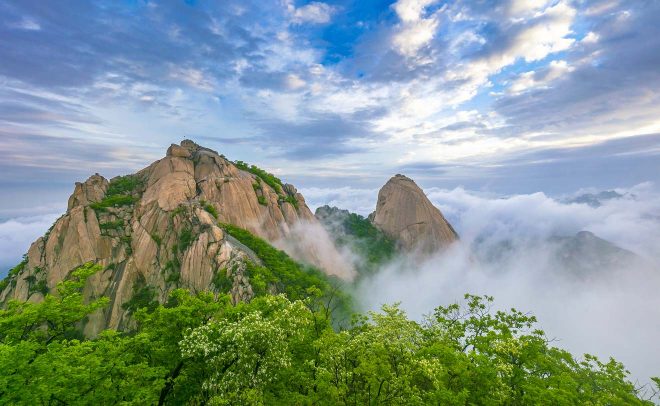
Bukhansan National Park has some of the most beautiful trekking trails among creeks and mountain scenery!
I recommend going for this 7-hour trek tour around the Bukhansan Mountain; you will see many gorges and granite peaks! You will then arrive at Doseonsa Buddhist Temple and then the highest peak of Baegundae. This trek can take you between 4 and 6 hours; it mostly depends on your individual pace. Don’t rush, the main idea is to enjoy the landscapes!
You can also consider climbing up Wonhyobong Peak which is frequented by many locals!
PRO TIP: Don’t plan your hike on weekends or during peak seasons because the trails get very crowded.
3. Busan
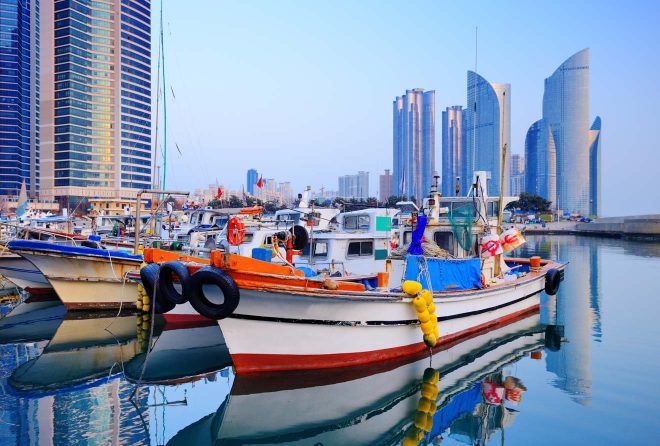
Busan is a city on the southern coast of Korea that is filled with lovely historical sights and breathtaking beaches! During this full-day tour, you will arrive in Busan and get to visit the Yonggungsa Buddhist Temple located on a cliff, have a customized photo-shoot at Songjeong Beach with its peaceful surroundings, and even head over to the biggest market place with tons of delicious street food, most of it local seafood dishes!
PRO TIP: This is a customized tour, meaning you can request specific eating restrictions or preferences for tourist attractions, such as stopping for a visit at the most luxurious Busan Spa, or going to the mall for some shopping.
4. Nami Island
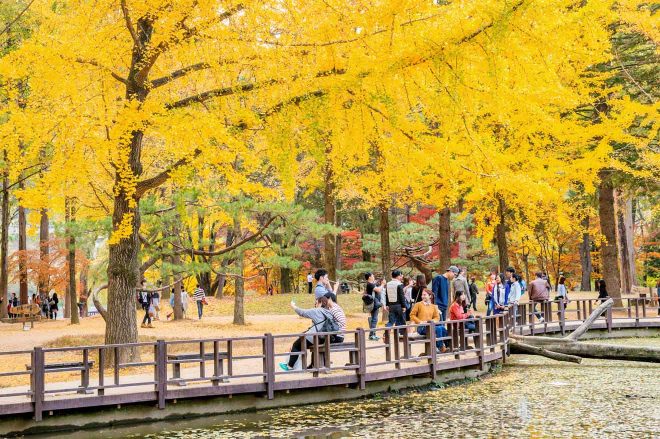
Nami Island is famous for its half-moon shaped land and it’s a great place to visit with kids as well!
Because it’s on the slight-outskirts, I recommend you go for an organized tour that not only includes the trip to the island but also a combined ticket to see Petite France or the Garden of Morning Calm if you choose, perfect to get in touch with nature and relax.
BONUS 4: Things To Do in Seoul With Kids
I know that many of you are not traveling by yourselves, but with your families, so I created this list of amazing things to do in the city with kids! Here are some great, fun things to do in Seoul:
1. Lotte World Theme Park
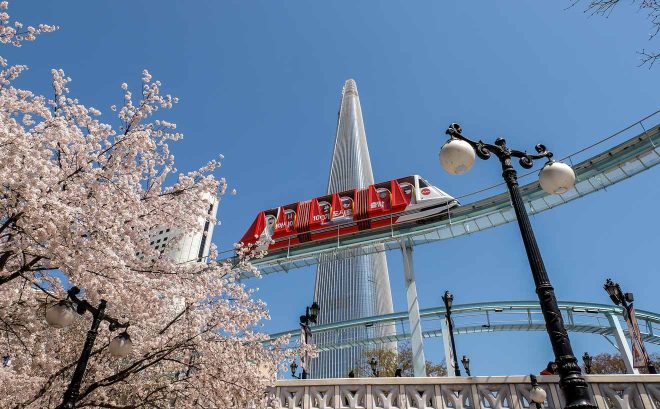
Visit Lotte World – a complex that has an indoor theme park, an outdoor amusement park, an artificial island, a Korean folk museum, and even a movie theatre!
Lotte World Adventure is a place where you can learn about different countries, taste a variety of international cuisines, and enjoy the biggest indoor amusement park in the world. Over at Lotte World Garden Stage you can listen to different themed musicals that match the season, and the Lotte World Star Avenue showcases local Korean stars.
NOTE: Nighttime admission starts at 4PM, and has a cheaper ticket price, an almost 10,000 KRW (US$8.50) difference. But arriving later means less time around the games so I don’t think it’s worth the savings.
PRICE: 57,000 KRW (US$48) per adult for a one-day ticket. But I found a cheaper option (US$26) on Klook compared to the official website.
2. Seoul Land
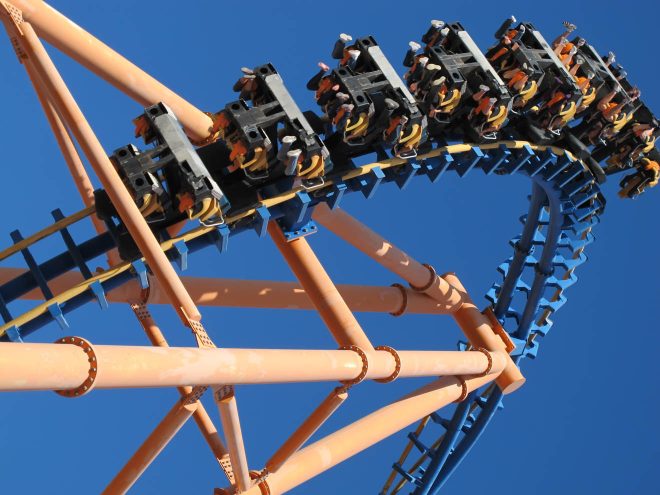
Seoul Land is a fun, adventurous thing to do and I recommend taking the kids up to the Seoul Grand Park Complex. It has approximately 40 rides that include roller coasters and movie theatres, all fit for all ages!
If you are not such a fan of adrenaline rushes, you can step away from the rides and walk around the World Square where you will find traditional buildings from all over the world.
PRICE: 46,000 KRW (US$39) Day-time One-day Pass per adult on the official website, but I found a much better and cheaper price here (US$14).
3. Everland Amusement Park
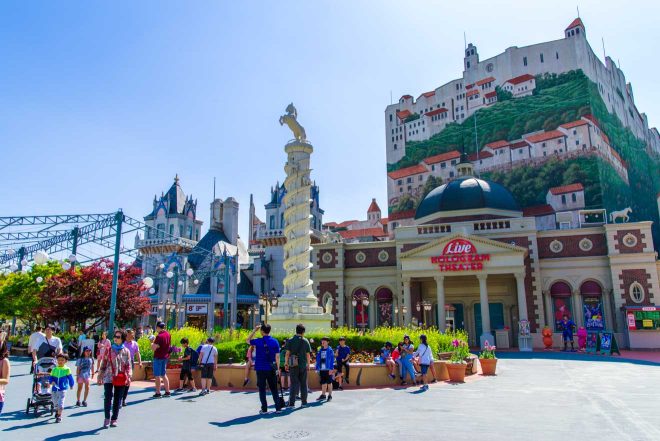
Everland Amusement Park is one of the largest theme parks in South Korea!
Its old name was “Jayeon Nongwon” which translates to something like “natural farm”. The theme park is divided into five sections and it has many fantastic rides! All in all, it is a magical and entertaining place for all kids who might be looking for something different than the grown-ups’ palace and tower tours!
If you are not into many rides you can always enjoy the seasonal themed festivals like Tulip Festival, Rose Festival, Summer Splash, Halloween Festival, and more.
Grab your day pass on Klook — they always run great promotions so you’ll definitely be able to grab a great skip-the-line ticket deal with them.
If you need transfer, I suggest taking this transfer bus from Seoul to Everland that includes tickets to the attractions so you don’t have to worry about how to get to the theme park!
PRICE: 56,000 KRW (US$47) one-day adult ticket / 44,000 KRW (US$37) one-day child ticket. Book your ticket here.
4. Children’s Grand Park
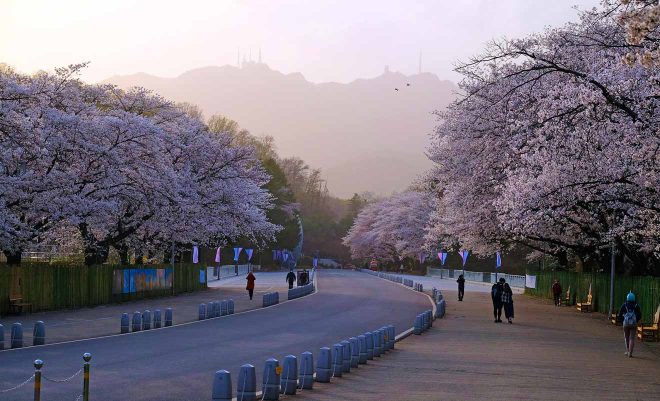
Taking the family over to the Children’s Grand Park is an amazing idea to enjoy this nature-related theme park that has a zoo, a botanic garden, children’s playgrounds and a small amusement park. You can think of it as a small children’s paradise with all the most healthy and attractive fun stations!
As part of the fun and educational side, there are also experience programs like “Animal School” and “Ecology Touring Class” that can be joined throughout the year.
PRICE: Free entrance to the park, you only pay for each facility you visit (stadium, tennis court etc.). Check the updated fees here.
Practical information about traveling to Seoul
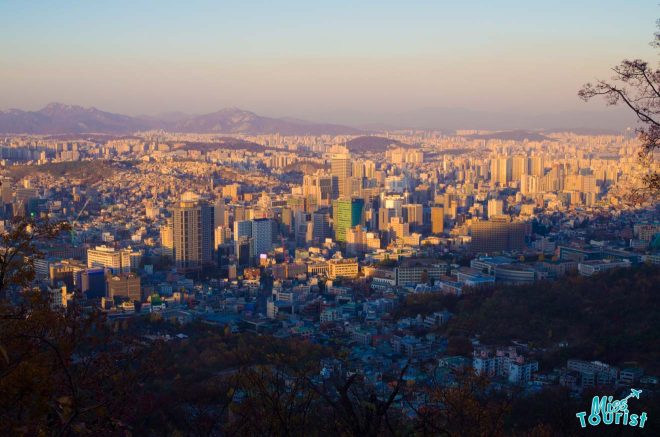
After sharing with you some unique things to do in Seoul and what you should see during your trip, I will also give you some practical tips about the city that I learned while I was there!
How to get from the airport to the city
First observation is that there are two airports in Seoul – Incheon International Airport which is 60 km away from the city, and Gimpo International Airport which is 20 km from Seoul (although its name says “international”, the majority of their flights are domestic ones). You will most probably arrive at the first one, just like I did. Then I flew out from Gimpo to Taiwan, so I can tell you how to get to/from both of them!
From Incheon
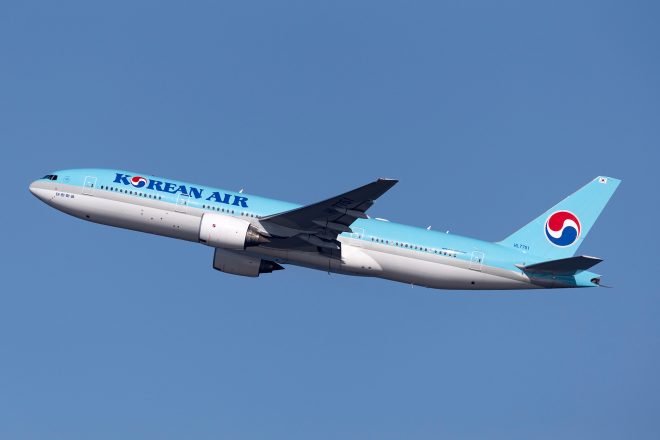
The airport is 60 km away from Seoul city center. These are your options:
Take the A’REX train, which is your best option for time and price! The train takes 43 minutes and heads straight to the Seoul Station for a price of 5,400 KRW (US$4.50). Check the updated price here.
The All Stop Train takes less than 60 minutes to get to Seoul station and costs 4,150 KRW (US$4).
You can also take a taxi from the taxi stands across from the Arrivals Hall (1F). Their fare starts at 3,800 KRW (US$3). But if you don’t want any communication problems go for an International Taxi, with fares ranging between 65,000 – 90,000 KRW (US$55 – US$76) and they take 60 minutes to get to the city.
From Gimpo
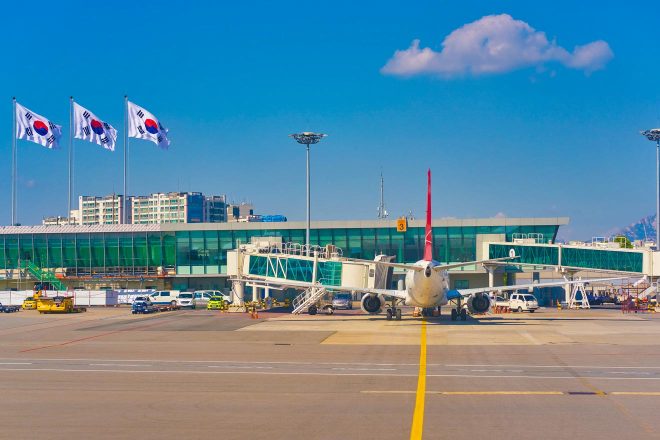
This airport is only 20 km from Seoul city center. These are the options:
You can take the All Stop train to Seoul Station. The journey takes 22 minutes and the price is 1,450 KRW (US$1.20).
NOTE: You will be charged a 500 KRW deposit on this ticket which you can get refunded once you arrive at your station destination using the refund deposit machine.
You can also take the orange taxis to the city center in 25 minutes. The fare is based on the taxi meter and it will be around 15,000 KRW (US$13).
Transportation inside the city
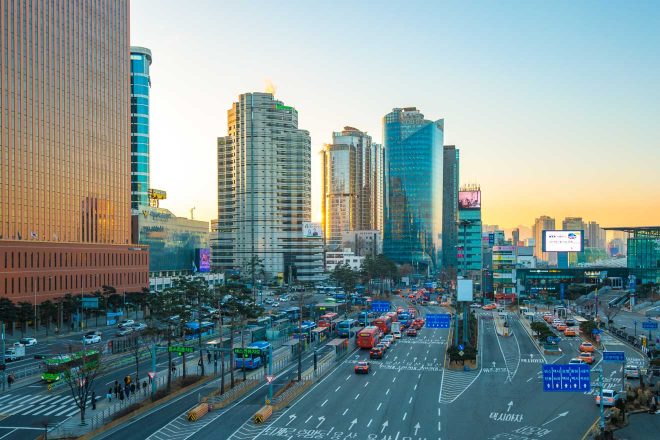
For Seoul, Google Maps is not my first recommendation to get around the city because it does not give you an updated walking time around the attractions. But you can switch and use Kakao Map App also found as Naver App. Unfortunately I never figured out how to use it during my stay because the interface was in English but the names only in Korean. I advise giving it a try; maybe you can just drop the pin at an approximate location if it doesn’t find the English names (or, maybe they updated it since then?). If this does not work, you can just stick to Google Maps.
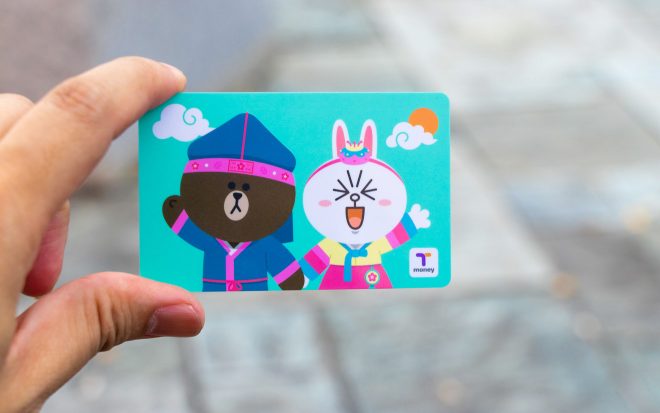
For local transportation I suggest buying the T-Money card and picking it up at the airport on arrival or purchasing it at most convenience stores or subway ticket booths. This rechargeable smart card will make your rides much cheaper on public transportation because for every single ride you save about 100 KRW if paid with the T-Money card.
PRO TIP: If you’re going back home and you still have between 500 KRW and 20,000 KRW on your card, you can return your card. You will get a refund in cash for the amount of money left on the card (minus 500 KRW service fee)
By bus
There are four colored buses each with a different route and with prices ranging between 1,100 KRW and 2,300 KRW. I recommend downloading Citymapper so you can see the number of stops you need to pass to reach your destination.
By metro
A single metro ticket costs 1,150 KRW and you can get them at “Ticket Vending” machine or by using a T-Money card. The orientation in the metro is quite hard because the direction of the metro shows the next station, not the final destination or big station, so it is better for you to have a map and be able to identify the stops you are interested in.
By taxi
You can use a T-money card at any taxi with a yellow triangular sign on the roof. For a 5 km ride that can take about 20 minutes, the price is around 7,000 KRW.
Seoul Pass
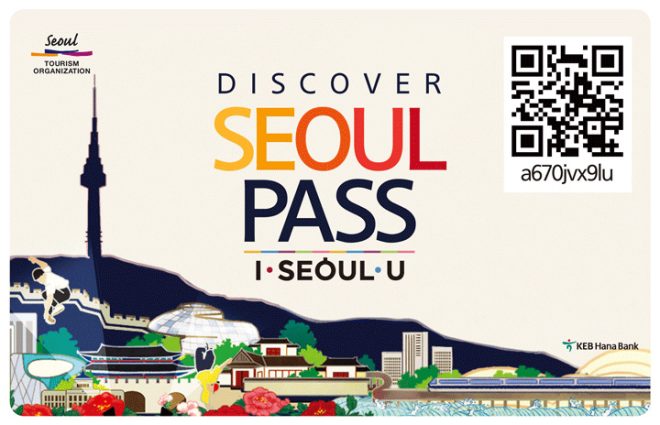
Discover Seoul Pass card is perfect for travelers that are in town for only a couple of days. The card works as a free admission ticket for many attractions such as N Seoul Tower, the Gyeongbokgung Palace, COEX Aquarium, among the total of 53 attractions. The pass also includes discounts to places like Lotte World, Seoul Land, and the Duty Free stores.
Plus, the card also works as a T-money card, so you can add money if needed, or even request a refund for any remaining balance during the time of use.
Sample calculation:
Let’s say you have 2 days in Seoul and you want to visit the following attractions:
Gyeongbokgung Palace (3,000 KRW) + N Seoul Tower (11,000 KRW) + COEX Aquarium (28,000 KRW) + National Museum of Modern and Contemporary Art (4,000 KRW) + Seoul City Tour Bus (20,000 KRW) = 66,000 KRW (US$55)
All these add up to the total of 66,000 KRW, while the 2-day card is 49,700 KRW.
You save: 66,000 – 49,700 = 16,300 KRW (US$14)
PRICE: 24hr-Pass 35,900 KRW (US$31) / 48hr-Pass 49,700 KRW (US$42) / 72hr-Pass 63,000 KRW (US$53).
Prices in Korea
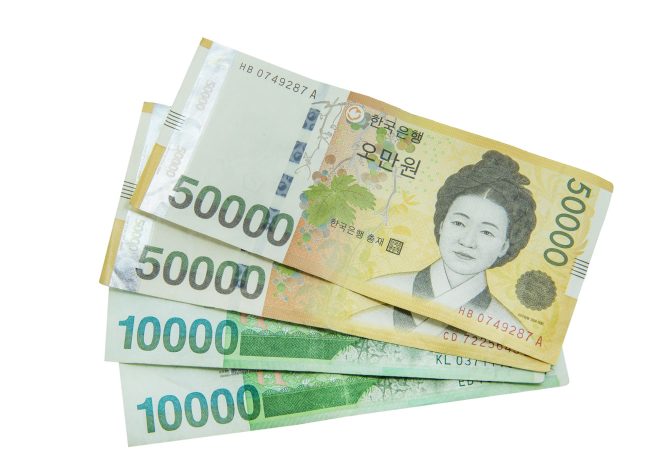
The biggest question of them all – is Seoul expensive? I hear you, and I will try to answer in the most honest way. An obvious fact is that some things are cheap while others are not, it all depends on where you purchase it.
You should know that in Korea, you can only pay with their local South-Korean Won (KRW). Here is a general idea of what the conversion rates are (click on the link to see up-to-date rate):
Let me give you an example of some expenses so you can get a better idea of how to spend your money:
- Single-ride public transport system ticket – 1,200 KRW (US$1)
- Accommodation for two in western European-like hotels – around US$60 a night for a good one
- Admission to attractions and museums – the most expensive one was 10 000 KRW (US$9)
- Traditional meal – it is fairly inexpensive, you can get a good Korean meal starting at 6,000 KRW (US$5) and if you want to go cheaper, you can always check out the street food stalls that can start at 1,000 KRW (US$1)
- Korean cosmetics are much cheaper here in Seoul, Korea (duh)! The sheet masks prices can start at 1,000 KRW (US$1), and I even bought a really good face cream for 33,000 KRW (US$28)!
PRO TIP: If you decide to go to a beauty salon for a manicure or any other service, be sure to ask about the full price beforehand. I remember I went in for a manicure and the price said 60,000 KRW (US$50), but by the time I finished, I was charged an additional 25,000 KRW (US$21) for some extra charges!
So overall, the prices are not expensive, but you will most probably go shopping. Even a travel blogger like me, who really doesn’t buy many things, was tempted and bought many cute things for myself!
Best hotels recommendations in Seoul
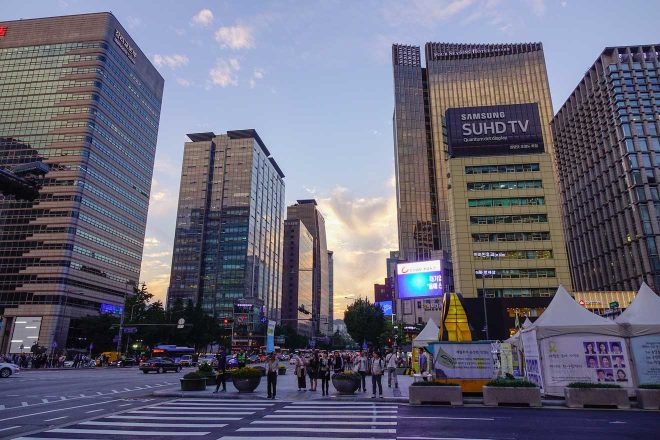
On my trip to Seoul, I stayed in 2 different accommodations (that is what happens when you book last minute, everything is taken!). But it was a good excuse to test out different hotels around the many districts, so that was fine. I recommend staying in Seoul city center because every main attraction is pretty much within a 15-minute walk away.
Here is my experience staying in the city:
During my trip, I stayed at an Airbnb the first 3 days, but to be honest, I did not enjoy it as much as a hotel. Why? Well, first of all, you might find some communication problems with the owner; probably because of our different mentalities we didn’t seem to understand each other as well as one would expect.
The owner did not give me the door code until the moment I landed at the airport. You will most probably need to figure out how the codes work for each door and how to unscramble the heating system that was in Korean (which is an adventure by itself, trust me!). On top of all that, the flat felt much smaller than expected, so my Airbnb experience in this country was not perfect.
My next accommodation was a hotel; I paid almost the same as the Airbnb place but got to have much more space. The hotel’s front desk clerk spoke good English so they could answer my questions, there was room service available everyday, and I did not need to figure out the heating part (yay!).
I am all for hotels when it comes to Korea! And if you want more options for accommodations, check out my article on hotels in each neighborhood!
Here are some very good options I can recommend in the city:
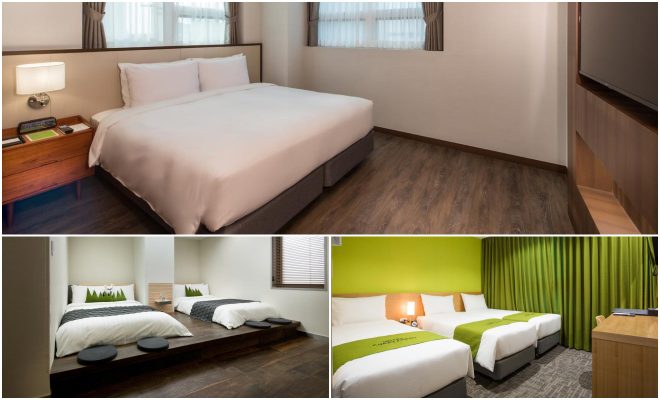
Luxury (US$160 and up)
- ENA Suite Hotel Namdaemun – All the hotel suites have air-conditioning, a flat-screen satellite TV, a fridge, an electric teapot, a closet, and a private bathroom with free toiletries. On the property you can also find a restaurant, a fully-equipped fitness center, and private parking if needed!
- Lotte City Hotel Myeongdong – This modern and fashionable hotel has an on-site fitness center and café for their guests, as well as a business center with computers to use for free if needed. All of their rooms include free Wi-Fi, air-conditioning, a flat-screen satellite TV, a fridge, and a private bathroom with free toiletries and slippers.
Middle-priced (from US$55 to US$160)
- Metro Hotel Seoul – This is the first government-registered tourist hotel in the city offering a modern fitness center, a business center, and even banquet facilities. All of their rooms have a flat-screen cable TV, a working desk, free Wi-Fi, and resizable mirrors.
- Fraser Place Central Seoul – This elegant and fun hotel offers small-sized apartments to their guests, all with great views of the city. In the afternoon you can plan on going to the Jacuzzi or steam room, or take your kids to the small indoor playground.
Budget (up to US$55)
- Hotel Kuretakeso Insadong – This option awaits with a fitness center, a sauna, and a 24-hour front desk. Every room has air-conditioning, a flat-screen satellite TV, an electric teapot, a desk, and a small fridge, plus free Wi-Fi. It has a warm and relaxed decor that gives you a homey feeling, perfect to relax with the city views.
- New Kukje Hotel – It is a great budget hotel that offers, among its amenities, massage services and a sauna for an extra fee. The rooms have an elegant décor and are equipped with a small seating area, a flat-screen TV, a fridge, a writing desk, and a private bathroom.
SIM cards
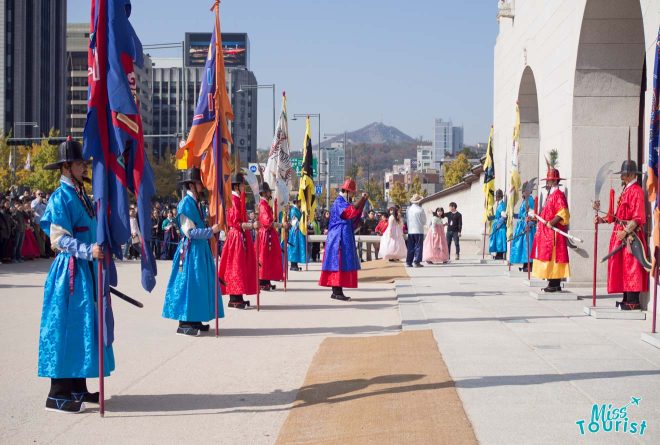
I will tell you this right from the start: make your life and Seoul trip easier by getting your local SIM card right in the airport after landing and before heading to your hotel!
The best SIM card for you is a KT Olleh prepaid 4G SIM Card starting at US$5 for 1 day. It can easily be picked up on the 1st floor of the Arrival Hall at Incheon International Airport, Gimpo International Airport, or even Busan airports.
Your other option is to rent a portable Wi-Fi hotspot if you are traveling with two people or more. It is a great chargeable device and for US$4 a day you can share 4G internet with up to 8 devices with no delays (similar to the pocket Wi-Fi in Japan). The only downside is that the only pick up location is at Incheon Int. Airport, but you can return the device at any other local airport!
When to visit Seoul
Most tourists escape from Seoul’s winter and summer and go during the seasons in between (spring and autumn) because the weather is not too freezing cold, nor warm and humid. I went in November when it was not cold, but it was good weather for a sweater.
My absolute suggestion is to go for at least 4 days to be able to enjoy the main sites before or after going for a delicious local meal. As I said earlier, I stayed for 7 days and although it was the right decision, there were still many things I didn’t manage to do. By the way, I advise going to the main attractions on weekdays so you can avoid the crowds and actually enjoy the Seoul points of interest and their panoramic views!
Do I need a visa for South Korea?
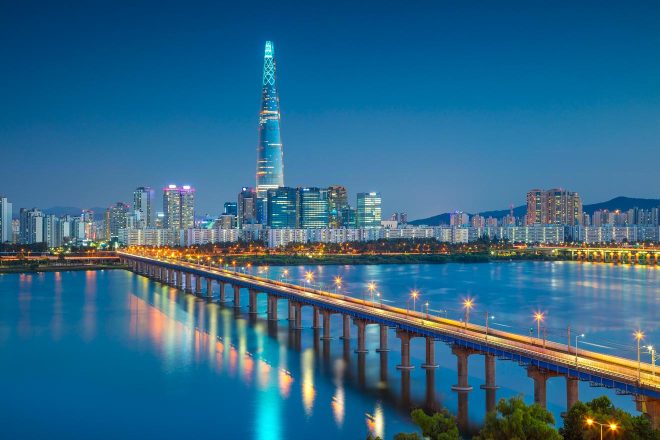
The countries that require their citizens to obtain a visa before heading to South Korea are mainly African and Asian countries. You can check if you country is classified in the visa-free list here.
Most of the countries are visa-free and have allow 90 days to stay in the city for tourism; you just need to say how many days you are staying when you arrive.
Is Seoul safe?
Seoul, as a city, is safe, crimes and theft are almost non-existent. For example, if you forget your phone on a table, you will come back and find it in the same place, nobody will take it. However, you should still stay alert for pickpockets.
I do recommend you double check the road before crossing the street; traffic in Seoul is a bit crazy! Other than that, the city of Seoul is definitely safe (but, as anywhere else in the world, use common sense).
FAQs about things do to in Seoul
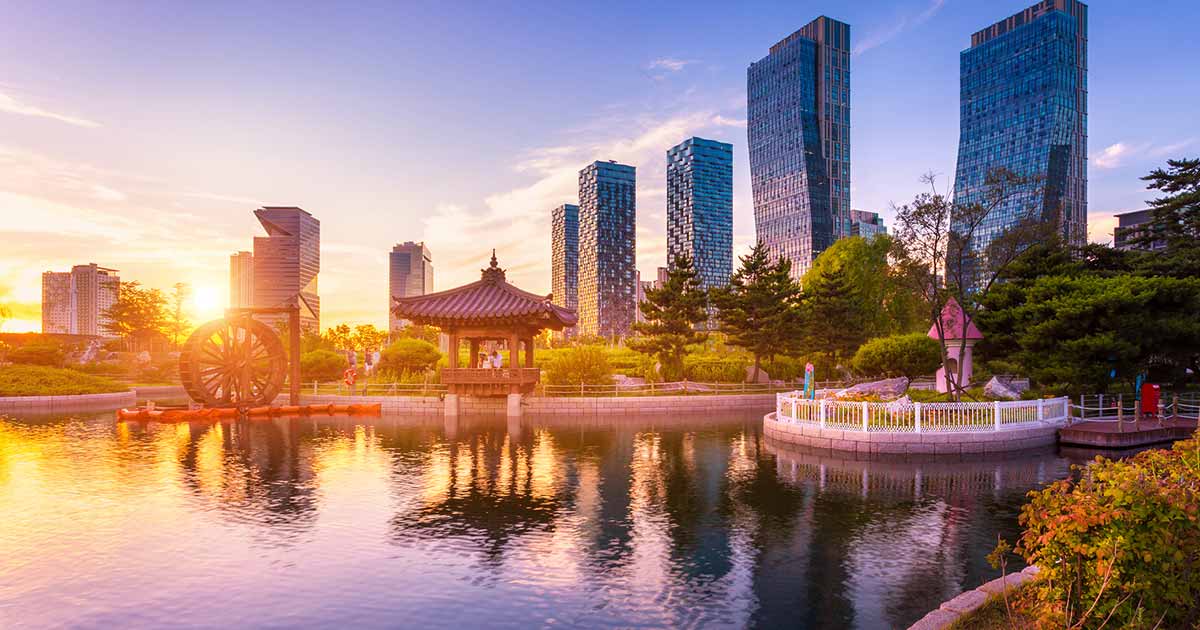
📅 What to do in Seoul in July?
In July, cool off at Lotte World’s indoor theme park, explore Bukchon Hanok Village’s shaded alleyways, and savor icy treats like bingsu at local dessert cafes.
Conclusion
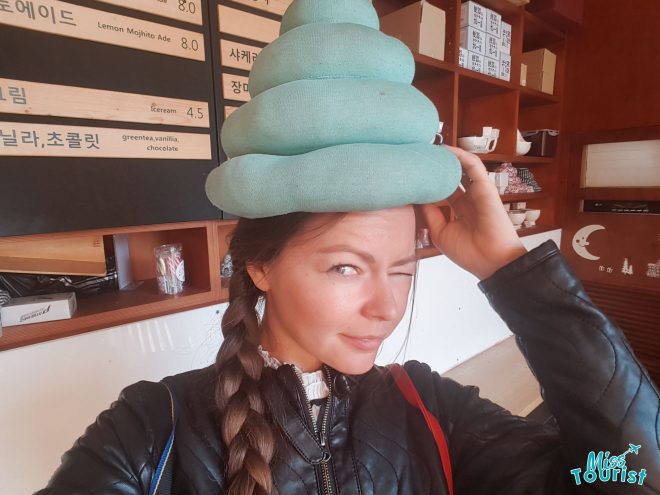
Seoul is such a unique, colorful city that offers so much – from spicy local dishes to fun theme parks and cultural attractions, its range of activities is perfect to fit any travelers’ preferences and budgets!
This was my complete list with my 18 best things to do in Seoul as well as some bonus activities, attractions to see, best hotels to stay in, local cuisine recommendations, and even some tips to save money on several tickets!
I must say that I stayed in Seoul for one week and I always found plenty of new things to do in the city! The must-visit list will just get bigger because Seoul has everything you can think of! It is heaven on earth for all foodies and shoppers.
I hope you enjoyed my Seoul travel guide and you will have a great time during your visit to Seoul!
If you have any questions, don’t hesitate to leave your comments in the section below, I love hearing from my readers!
Yulia
Pin it for later!
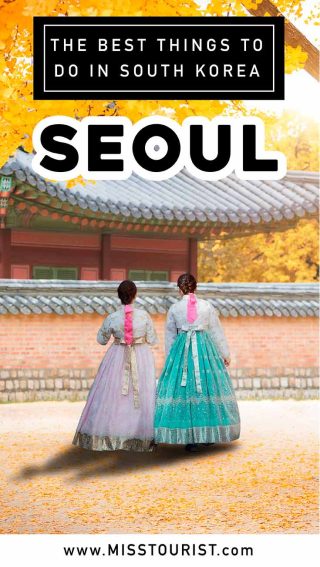
Pin it for later!
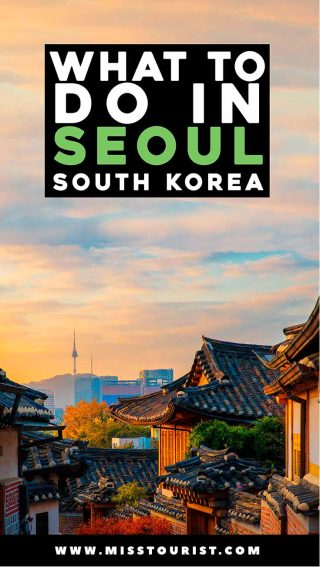

 Yulia Saf
Yulia Saf 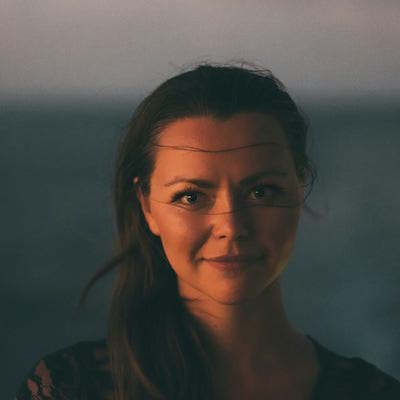






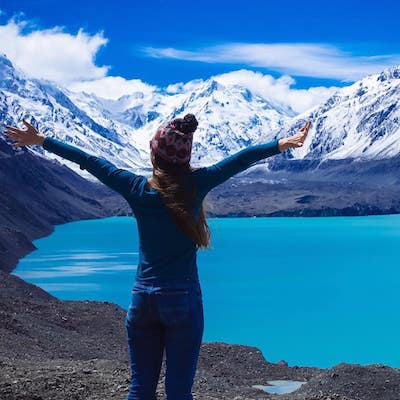
do they have lockers to store luggage bags at all subway stations ?
plan to leave Seoul to Suwon by train to the visit the Suwon Fortress , just wonder they have locker for luggage ay Suwon entrance ?
thank you .
Hi Austin!
Yep, they should have self services lockers where you can leave your luggage for a couple of hours!
Hallo Yulia! Your post is awesome, very detailed and you gave me such inspiration. Lovely to read all these vital things to know for our Seoul trip. Thank you so much for sharing this!
Awesome article, I covered most of these sites during my own time in Seoul! And of course, you have to take the obligatory Gangnam photo! Great list my friend!
Thank you for your article 🙂
i m planning to go next year… thank you for the info.
Thank you so much for this I spent my time reading this because me and my dad will go to south korea after this pandemic and I’m thinking about where to go and whats my lists? Thanks for this!! BTW I have a question I’ml learning hangul, when you’re in Korea do have a hard time talking to people?
Happy to help!
No, I don’t remember having any troubles talking to people in english (that is, in Seoul), but I tried to learn to read before just for fun, and I think that was quite helpful (at least to read the menu in super local places 🙂 )
You have the most detailed blog of Seoul! Thank you. It has helped me a lot for my next trip. Great work. Keep it up!
You are welcome, happy to hear that! 🙂
You’ve done a great job! Thanks for sharing!
It is helpful in my trip there.
Do you have info about Jiju island?
Again, thank you so much!
No, unfortunately I haven’t been there yet 🙁
I’ve lived in Seoul for a number of years, and this is such an accurate post! I’m happy you are leading people to the memorable places. As is always true with traveling, be sure to explore on your own off the beaten path. 🙂
Also, Namdaemun food market is larger with a broader selection for sure, but Gwangjang is much more authentic! Most of the food mentioned is in Gwangljang made by people with decades old recipes! Also, don’t forget to check out the meat markets and have some iffy Hanwoo as well as the Pochas to have delicious tent food when it’s in season!
I hope everyone loves Seoul as much as I do. 🙂
Thanks for your nice comment! 🙂
Really useful.
although I’m a Seouler, you’ve been to more places than me… In fact, Insadong or Myeong-dong is a place where Korean people never go, but many other palaces and amusement parks are places we go to a lot.
When the COVID19 is over, I will also refer to your information and visit Gyeongbokgung. Thank you for posting!
Awww, thanks so much, I am happy to hear that! 🙂 Hope it will be over soon and we all be able to travel, even if it is our own backyard!
Very informative. Thanks a lot!!
You are very welcome!
Thank you! You’re article is very helpful to those who wanted to check out Seoul 😀 It is a very detailed information.
Thank you, I’m glad you think so!
Very useful article! Thumbs up!
What a great blog. This is really useful. Thank you so much!
Thank you!
Wow, what a nice article. Thank you!
Great to hear you liked it!
Hello Yulia,
Thank you for your blog, it is really helpful. I am travelling to South Korea in the next couple of weeks and I want to find a hotel downtown where I presume all the action is. I have currently booked the four point by Sheraton in Namsan and I don’t know if it is any closer to the city centre and all the lovely places you recommended in Seoul.
Can you possibly recommend a hotel right at the heart of it all for me? Much appreciated, thank you.
Hello Anita,
Thank you!
For all kinds of accommodation in Seoul, take a look at this super detailed article from the blog! Here you’ll find all the districts we are recommending and why, as well as hotels for each one of them, divided by budget!
I hope you’ll have the best trip!